Creating a thoughtfully designed therapist room goes beyond simple decoration—it involves crafting a complete therapeutic environment that promotes healing, comfort, and trust. The physical space where therapy occurs can significantly impact treatment outcomes, as clients respond to visual cues, lighting, furniture arrangement, and overall ambiance. Modern therapeutic design emphasizes the integration of calming colors, natural elements, functional furniture, and purposeful decor to create spaces that feel both professional and welcoming. From minimalist zen concepts to biophilic nature-inspired themes, each design approach offers unique benefits for different therapeutic practices and client populations. The following twenty-five complete design themes represent holistic approaches to creating therapeutic environments that support both therapist and client well-being.
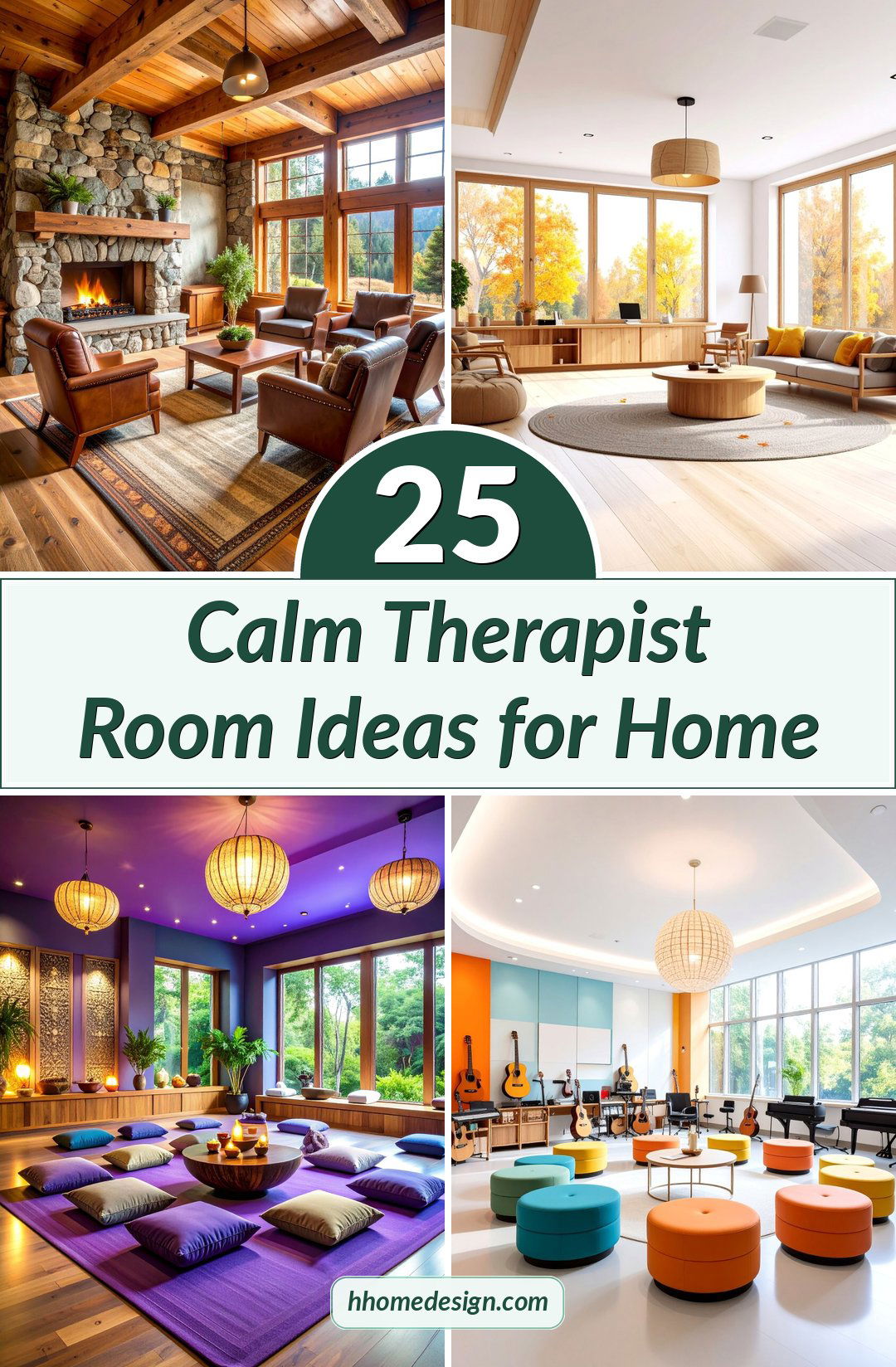
1. Zen Minimalist Therapist Room with Natural Wood
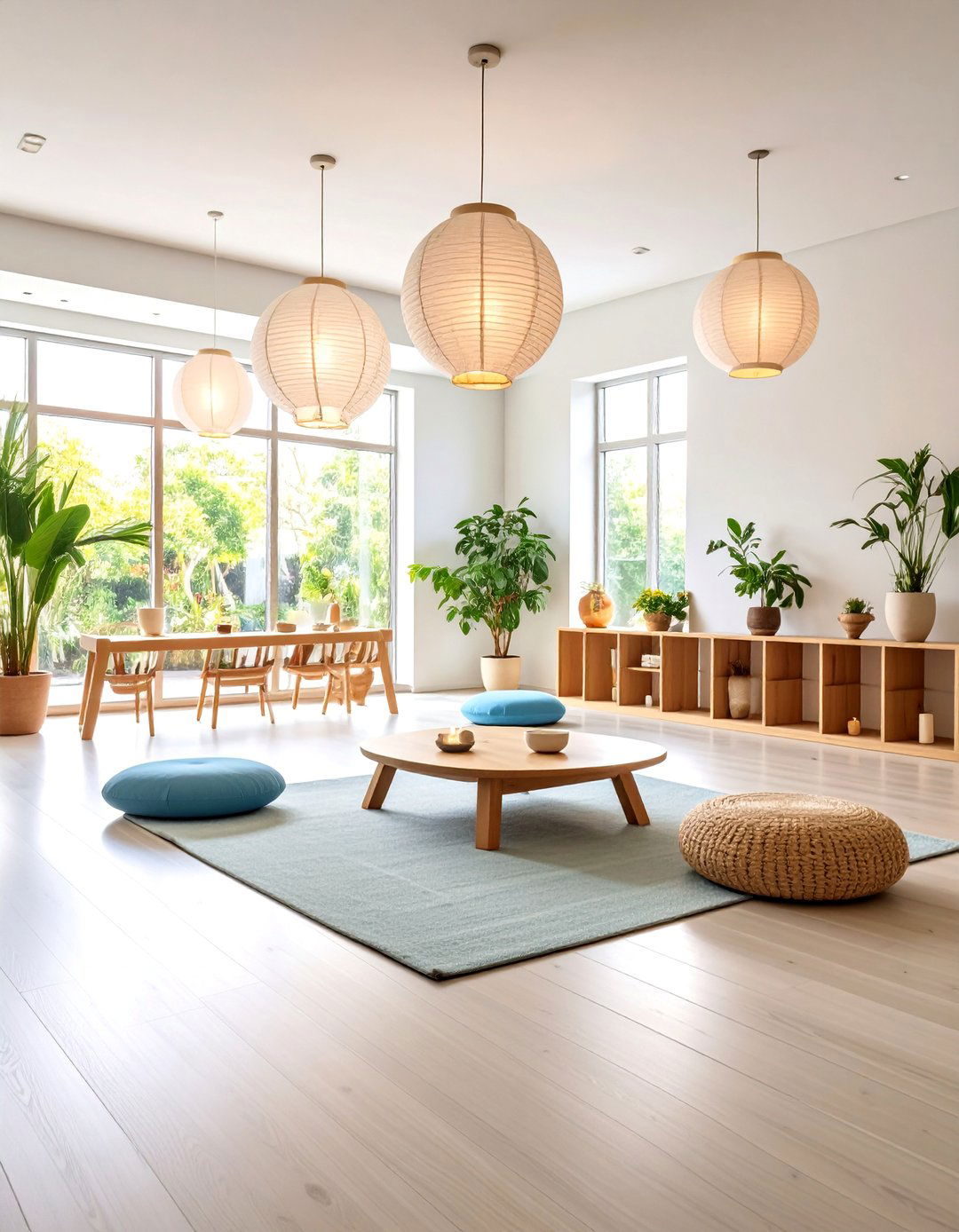
This serene therapeutic space embraces simplicity through clean lines, neutral colors, and carefully selected natural wood elements. The foundation features light oak or maple furniture, including a low-profile desk and streamlined seating arrangements that maintain visual openness. Walls remain pristinely white or soft beige, while natural wood accents appear in floating shelves, picture frames, and a central meditation table. The lighting design incorporates soft, diffused illumination through paper lanterns and adjustable warm LED fixtures that create gentle shadows. Strategic placement of one or two carefully chosen plants, such as a peace lily or snake plant, adds life without overwhelming the space. Storage solutions remain hidden within wooden cabinets, maintaining the uncluttered aesthetic essential for promoting calm and mental clarity during therapeutic sessions.
2. Biophilic Therapist Room with Living Green Wall
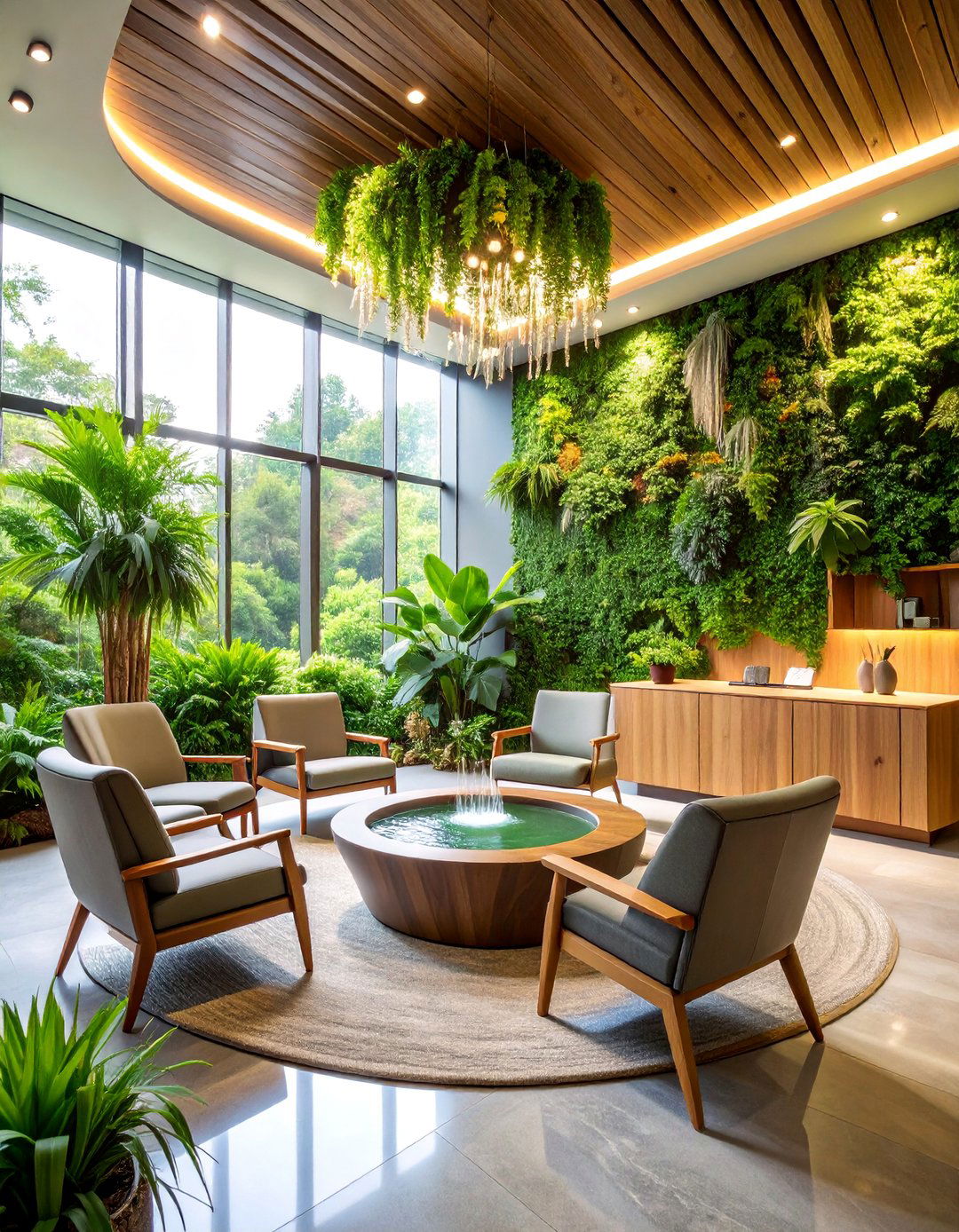
This nature-immersive therapeutic environment centers around a dramatic living green wall that serves as both art and air purification system. The vertical garden features a carefully curated selection of low-maintenance plants including pothos, philodendrons, and ferns, creating a lush backdrop that connects clients with nature. Natural materials dominate the space through reclaimed wood furniture, stone accents, and organic cotton textiles in earth tones. Large windows maximize natural light exposure, while full-spectrum LED lighting supplements during darker hours to maintain healthy plant growth. The seating arrangement includes ergonomic chairs positioned to provide optimal views of the green wall, promoting the stress-reducing benefits of nature observation. Water features, such as a small tabletop fountain, add gentle acoustic masking while enhancing the natural ambiance that supports psychological restoration and emotional healing.
3. Scandinavian Hygge Therapist Room with Cozy Textiles
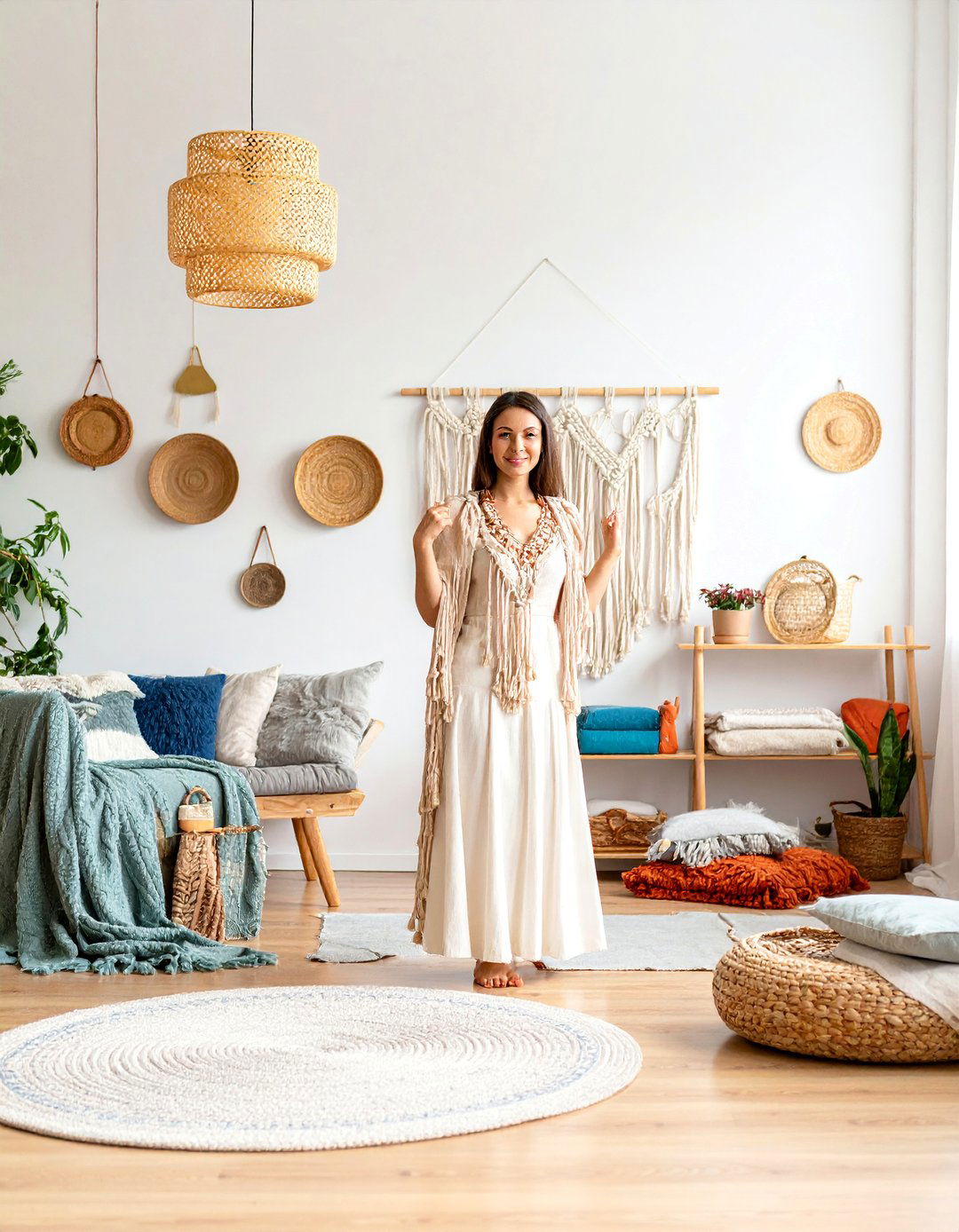
This Nordic-inspired therapeutic space embodies the Danish concept of hygge through warmth, comfort, and intimate coziness. The foundation features light wood floors, white walls, and furniture in blonde wood tones, creating a bright and airy atmosphere. Layered textiles become the star elements—soft wool throw blankets, sheepskin rugs, and linen cushions in muted grays, creams, and soft blues add tactile comfort and visual interest. The lighting design emphasizes warmth through vintage brass pendant lights, candles in glass holders, and table lamps with fabric shades that create pools of gentle illumination. Functional storage appears in beautiful woven baskets and wooden crates that maintain organization while adding texture. This design promotes feelings of safety and comfort, encouraging clients to relax and engage more openly in therapeutic conversations within an environment that feels like a welcoming home.
4. Bohemian Therapist Room with Global Cultural Elements
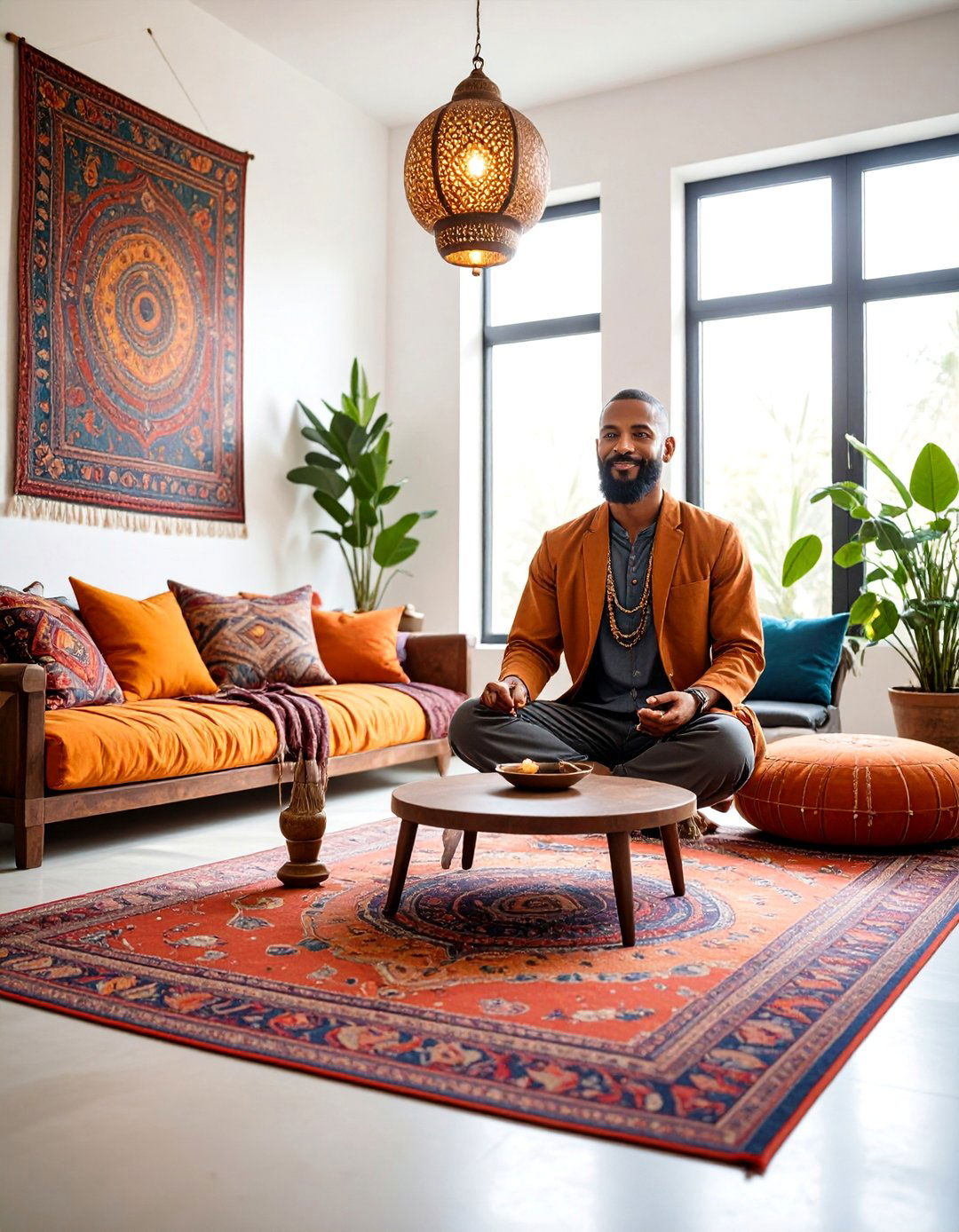
This eclectic therapeutic environment celebrates diversity and personal expression through carefully curated global cultural elements and rich textures. The color palette blends warm earth tones with jewel accents—deep terracotta, mustard yellow, and forest green create an inviting foundation while peacock blue and amethyst provide vibrant touches. Furniture mixes vintage pieces with handcrafted items, including a Moroccan-style coffee table, Indian block-print cushions, and Persian-inspired rugs that add cultural depth. Wall art features meaningful pieces from various cultures, including mandala tapestries, African textiles, and contemporary abstract paintings that reflect inclusivity. Layered lighting includes pendant lanterns, string lights, and salt lamps that create a warm, intimate atmosphere. This design approach helps clients from diverse backgrounds feel welcomed and represented while encouraging self-expression and cultural pride within the therapeutic process.
5. Industrial Chic Therapist Room with Exposed Elements
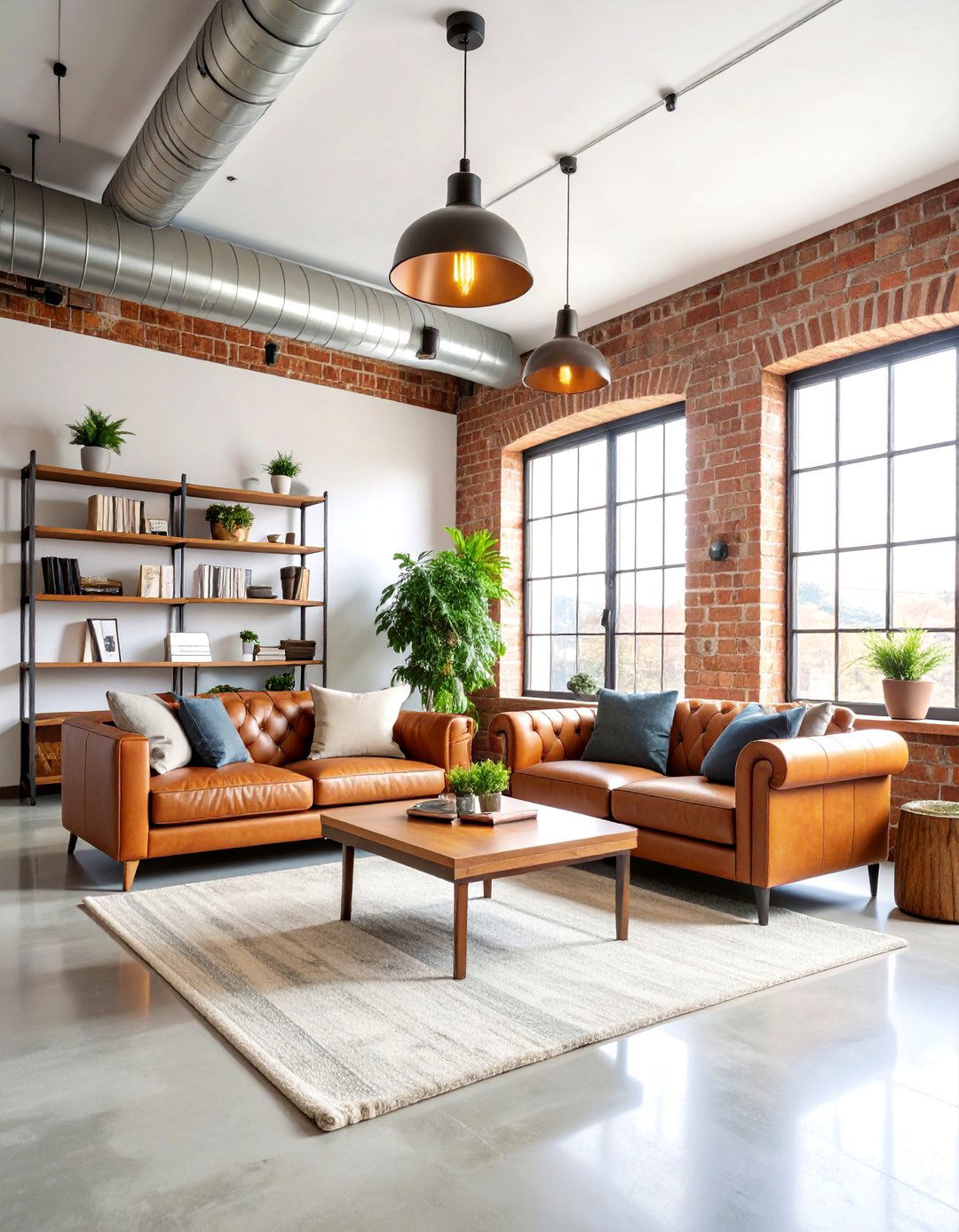
This contemporary therapeutic space balances raw industrial elements with warm comfort features to create a unique urban atmosphere. Exposed brick walls, visible ductwork, and concrete floors provide the industrial foundation, while strategic additions of warmth prevent the space from feeling cold or institutional. Rich leather furniture in cognac or charcoal tones offers both durability and comfort, complemented by vintage metal lighting fixtures with Edison bulbs that cast warm, atmospheric light. Reclaimed wood elements appear in desks, shelving, and accent walls, softening the harder materials and adding natural warmth. Large industrial-style windows maximize natural light while metal-framed artwork and vintage typography create visual interest. The color scheme focuses on neutrals—grays, browns, and blacks—with carefully placed green plants that add life and soften the harder edges of this distinctive therapeutic environment.
6. Mediterranean Therapist Room with Warm Earth Tones
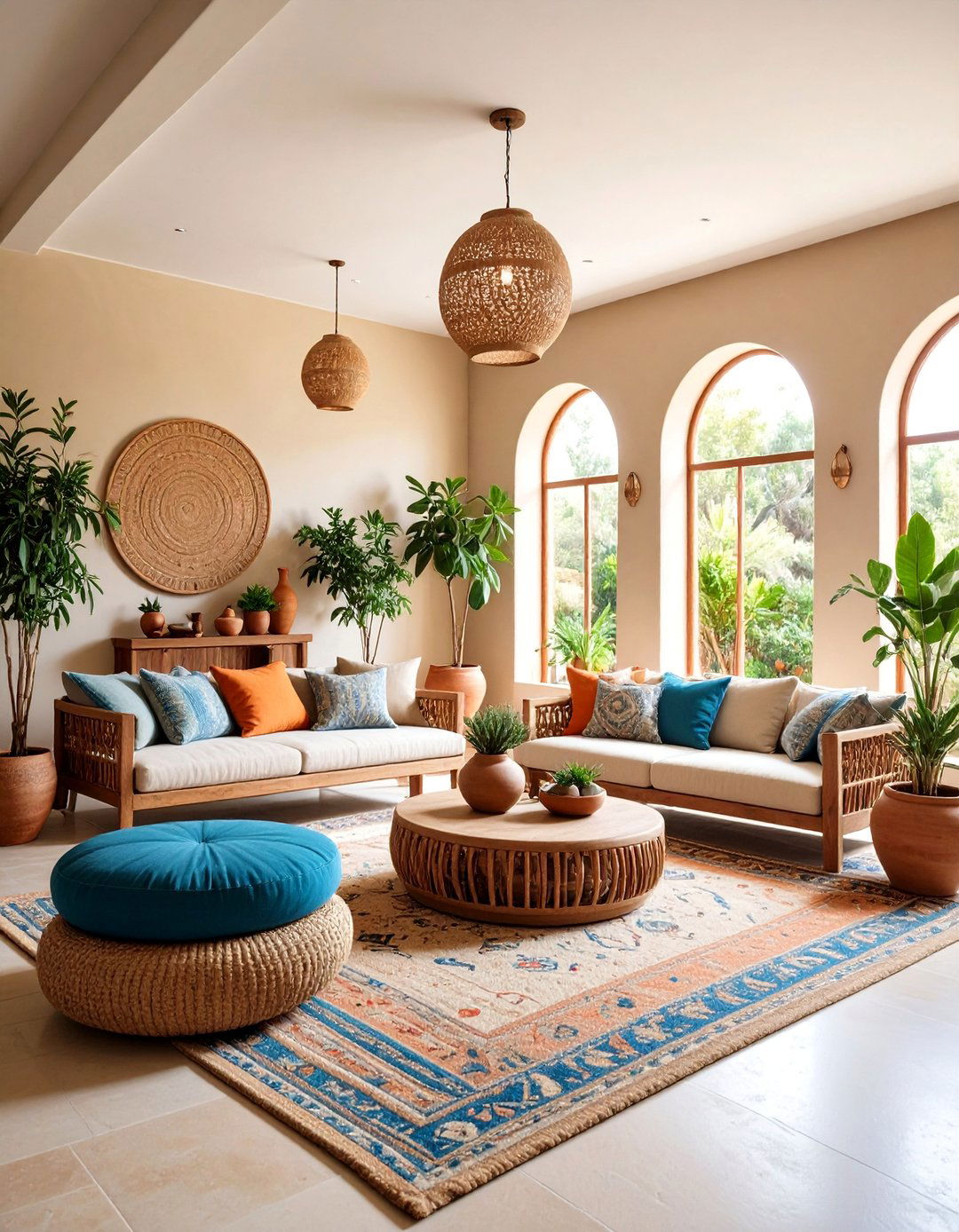
This sun-soaked therapeutic environment draws inspiration from coastal Mediterranean design through warm colors, natural textures, and light-filled spaces. The foundation features terra cotta or warm beige walls complemented by natural stone accents and rustic wooden furniture pieces. Seating includes comfortable upholstered chairs in linen fabrics featuring sandy beiges, soft corals, and ocean blues that evoke seaside tranquility. Decorative elements include ceramic pottery, woven baskets, and artwork depicting olive groves, vineyard landscapes, or coastal scenes that transport clients to peaceful Mediterranean settings. Natural lighting streams through sheer curtains in cream or white, while wrought iron fixtures add authentic architectural details. Olive trees or lavender plants in ceramic planters introduce the aromatic elements characteristic of Mediterranean gardens. This design creates a vacation-like atmosphere that helps clients escape daily stresses and connect with the restorative power of warm, welcoming environments.
7. Japanese-Inspired Therapist Room with Tatami and Shoji Elements
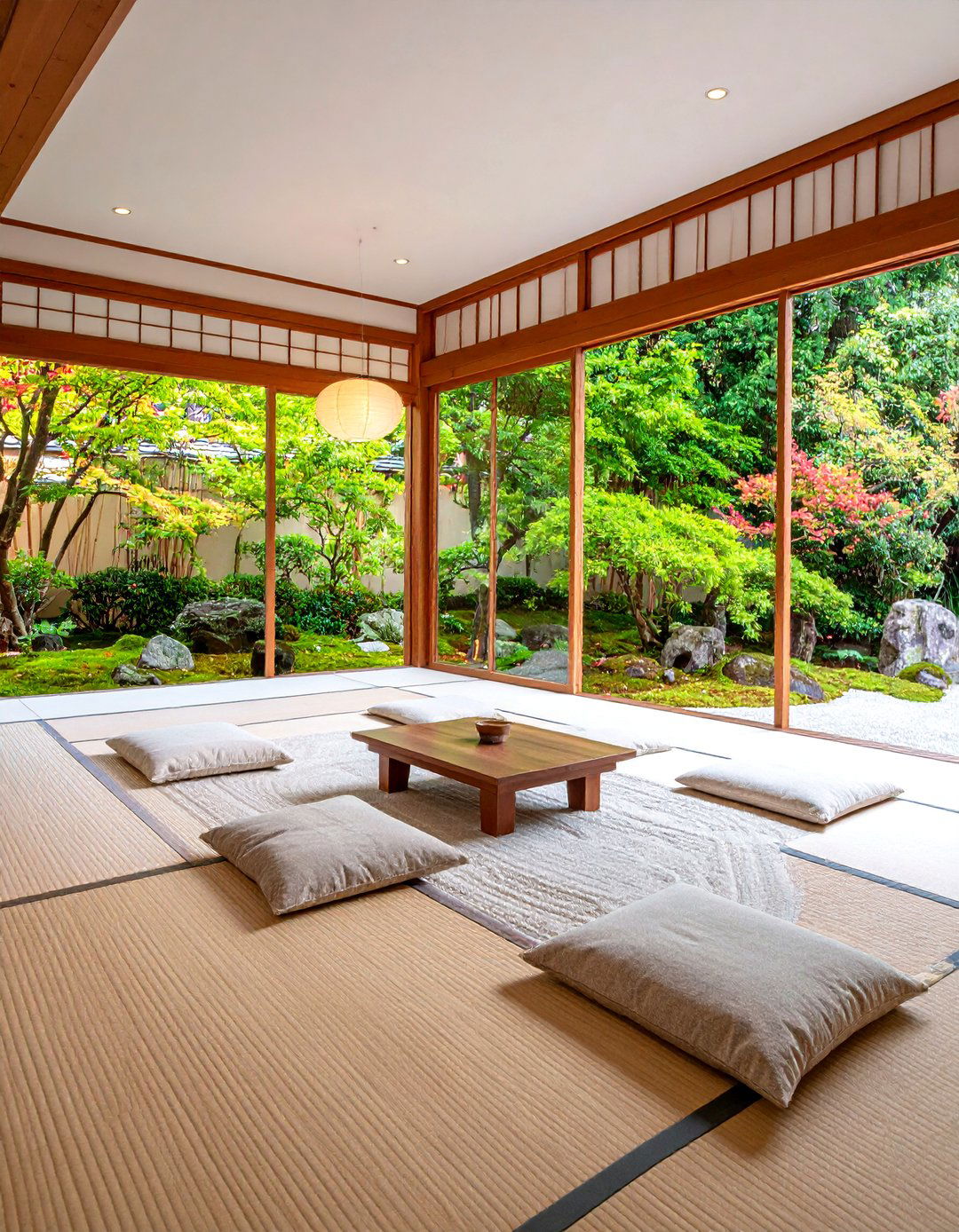
This tranquil therapeutic space incorporates authentic Japanese design principles to create an environment of peace, balance, and mindful reflection. Traditional tatami mats provide flooring that encourages grounding and connection to ancient practices, while shoji screens serve as room dividers and window coverings that filter light beautifully. The furniture selection emphasizes low profiles—floor cushions, meditation mats, and a low wooden table for tea ceremonies or mindfulness exercises. A small zen garden with raked sand and carefully placed stones offers a focal point for contemplation and stress relief. The color palette remains strictly neutral with natural wood tones, white walls, and black accents that create visual harmony. Bamboo plants and bonsai trees add living elements that represent growth and patience. This design supports therapeutic approaches focused on mindfulness, meditation, and Eastern philosophical concepts while providing a serene escape from Western cultural pressures.
8. Art Therapy Therapist Room with Creative Expression Zones
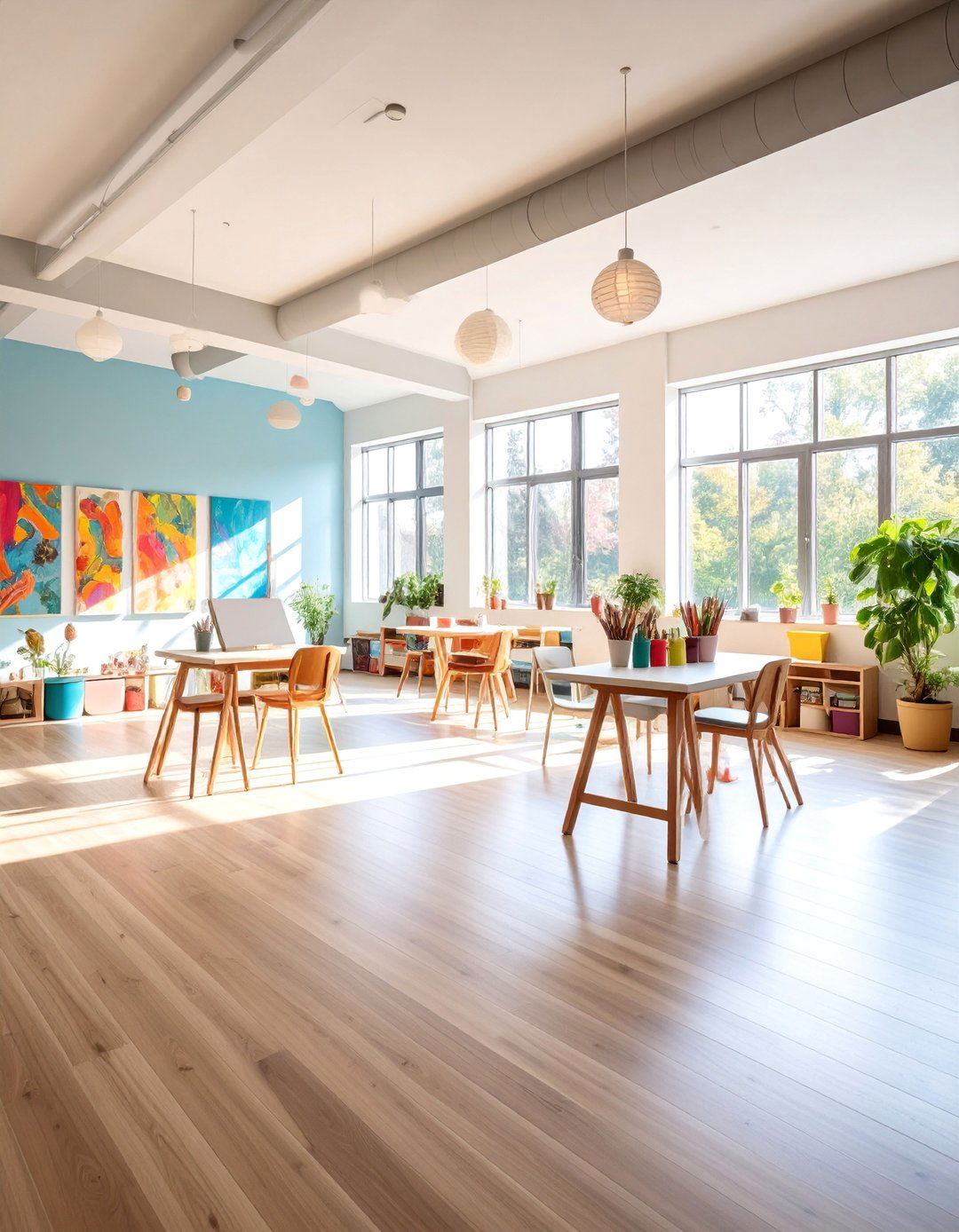
This vibrant therapeutic environment supports creative expression through dedicated spaces for various artistic media and inspiration-rich surroundings. The foundation includes easily cleanable surfaces—vinyl flooring, washable wall paint, and durable furniture that can withstand art-making activities. Multiple workstations accommodate different artistic pursuits: an easel area with good lighting, a table for drawing and writing, and floor space for movement-based expressions. Storage solutions include clear containers for art supplies, hanging organizers for tools, and display areas for showcasing completed works. The color scheme balances neutral backgrounds with colorful accents that inspire creativity without overwhelming sensitive clients. Natural lighting combines with adjustable task lighting to support detailed artistic work. Gallery walls feature rotating displays of client artwork and inspiring pieces that encourage creative exploration. This environment empowers clients to express emotions through art while providing therapists with valuable insights into their clients' inner worlds.
9. Rustic Lodge Therapist Room with Natural Stone Features

This cabin-inspired therapeutic space creates a retreat-like atmosphere through natural materials, warm colors, and cozy architectural elements. The foundation features natural stone walls or accents, exposed wooden beams, and wide-plank hardwood floors that establish a connection to nature. Furniture includes leather chairs with nailhead trim, rustic wooden coffee tables, and built-in bookcases filled with therapeutic resources and nature-themed literature. A stone fireplace serves as the room's focal point, providing both visual warmth and optional ambient heating during colder months. The color palette draws from forest and mountain inspirations—deep greens, rich browns, and warm reds create an enveloping environment. Plaid or Native American-inspired textiles add authentic touches through throw pillows, blankets, and window treatments. This design appeals to clients who find comfort in traditional, nature-connected environments and supports therapeutic work focused on grounding, stability, and emotional security.
10. Contemporary Therapist Room with Clean Geometric Lines
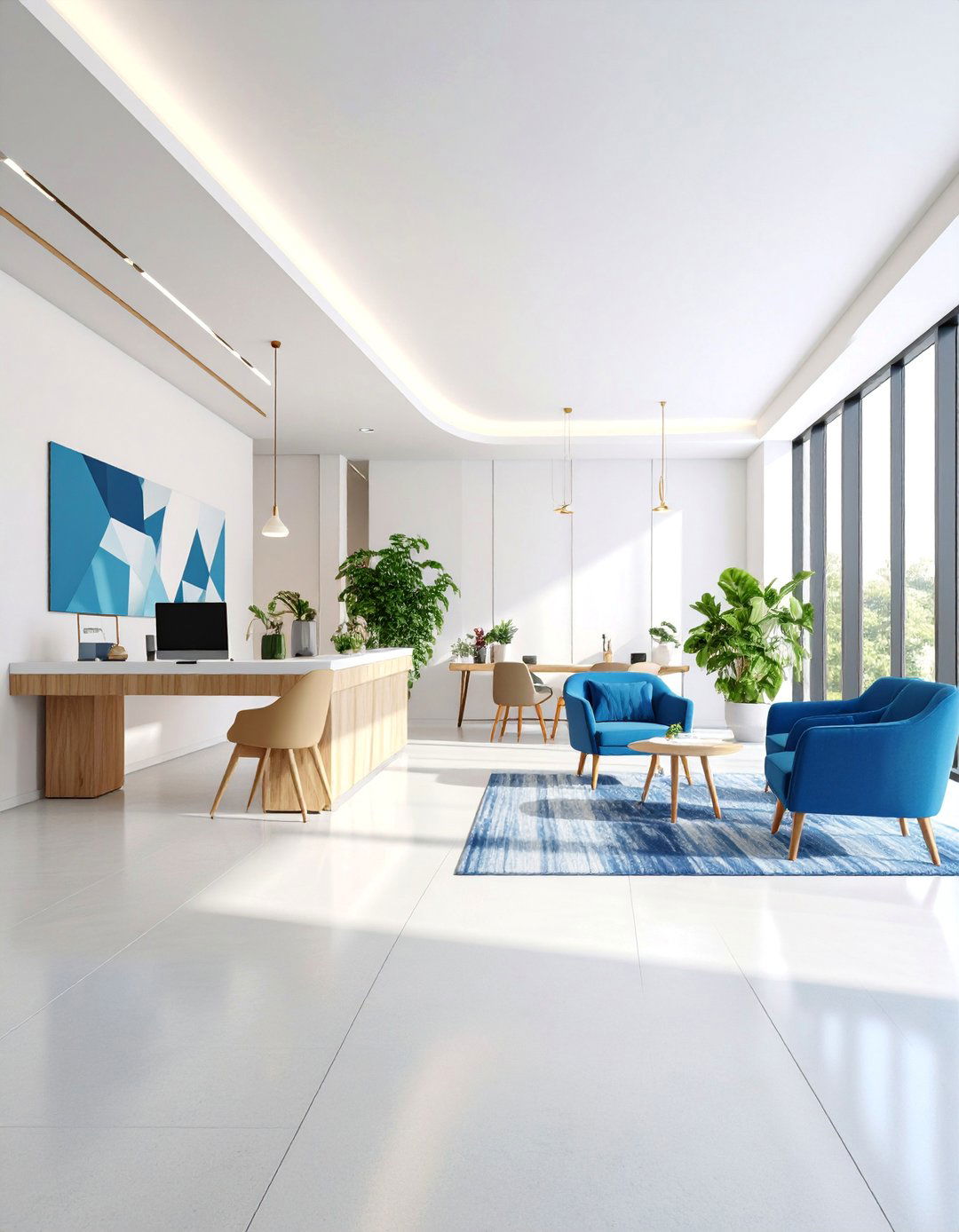
This modern therapeutic environment emphasizes sophistication and clarity through precise geometric forms, streamlined furniture, and carefully controlled color schemes. The foundation features polished concrete or large-format tile flooring, pristine white walls, and furniture with clean, angular lines that create visual order and mental clarity. The seating arrangement includes ergonomic chairs in quality fabrics, positioned around a geometric coffee table that serves both functional and aesthetic purposes. Lighting design incorporates linear LED fixtures, geometric pendant lights, and strategically placed accent lighting that creates dramatic shadows and visual interest. The color palette focuses on a monochromatic scheme with one or two bold accent colors—perhaps deep navy or forest green—that add depth without chaos. Abstract geometric artwork and sculptural elements reinforce the contemporary aesthetic while maintaining therapeutic appropriateness. This design appeals to clients who find comfort in structure, organization, and modern environments while supporting therapeutic approaches that emphasize clarity and goal-oriented progress.
11. Sensory-Rich Therapist Room with Textural Elements
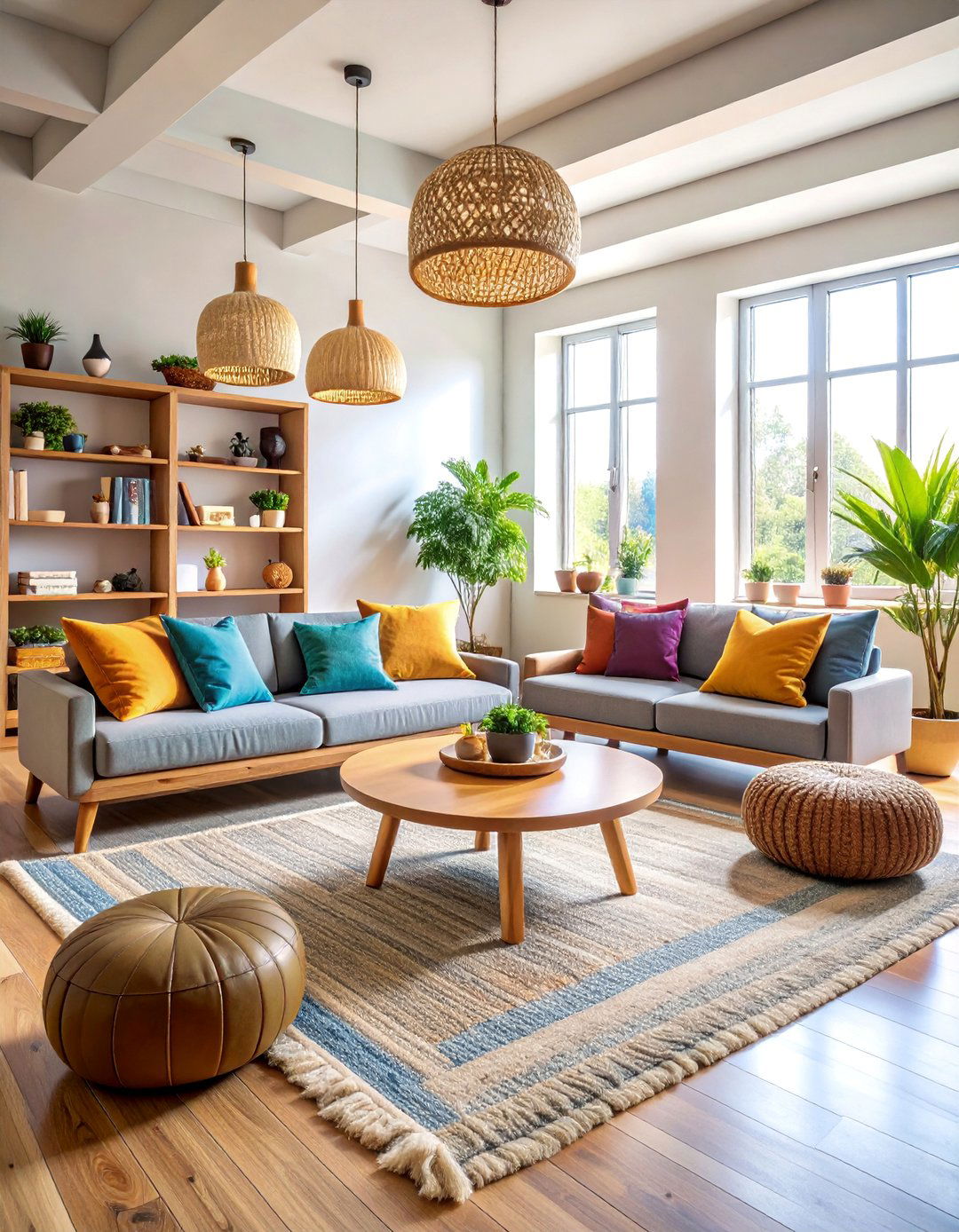
This tactile therapeutic environment integrates multiple textures and sensory experiences to support clients with sensory processing needs or those who benefit from grounding techniques. The foundation includes various flooring textures—soft area rugs, smooth wood sections, and textured carpet tiles that provide different sensory experiences. Furniture selection emphasizes tactile variety through velvet upholstery, smooth leather surfaces, rough linen fabrics, and polished wood finishes. Wall treatments include textured wallpaper, fabric panels, and natural materials like cork or bamboo that invite touch and exploration. The space includes fidget tools, stress balls, weighted blankets, and textured cushions that clients can use during sessions. Lighting options range from bright task lighting to dim ambient illumination, allowing for sensory regulation based on individual needs. Scent elements include essential oil diffusers with calming lavender or energizing citrus options. This design supports therapeutic work with autism spectrum clients, trauma survivors, and individuals with anxiety disorders who benefit from sensory regulation techniques.
12. Trauma-Informed Therapist Room with Safety-Focused Design
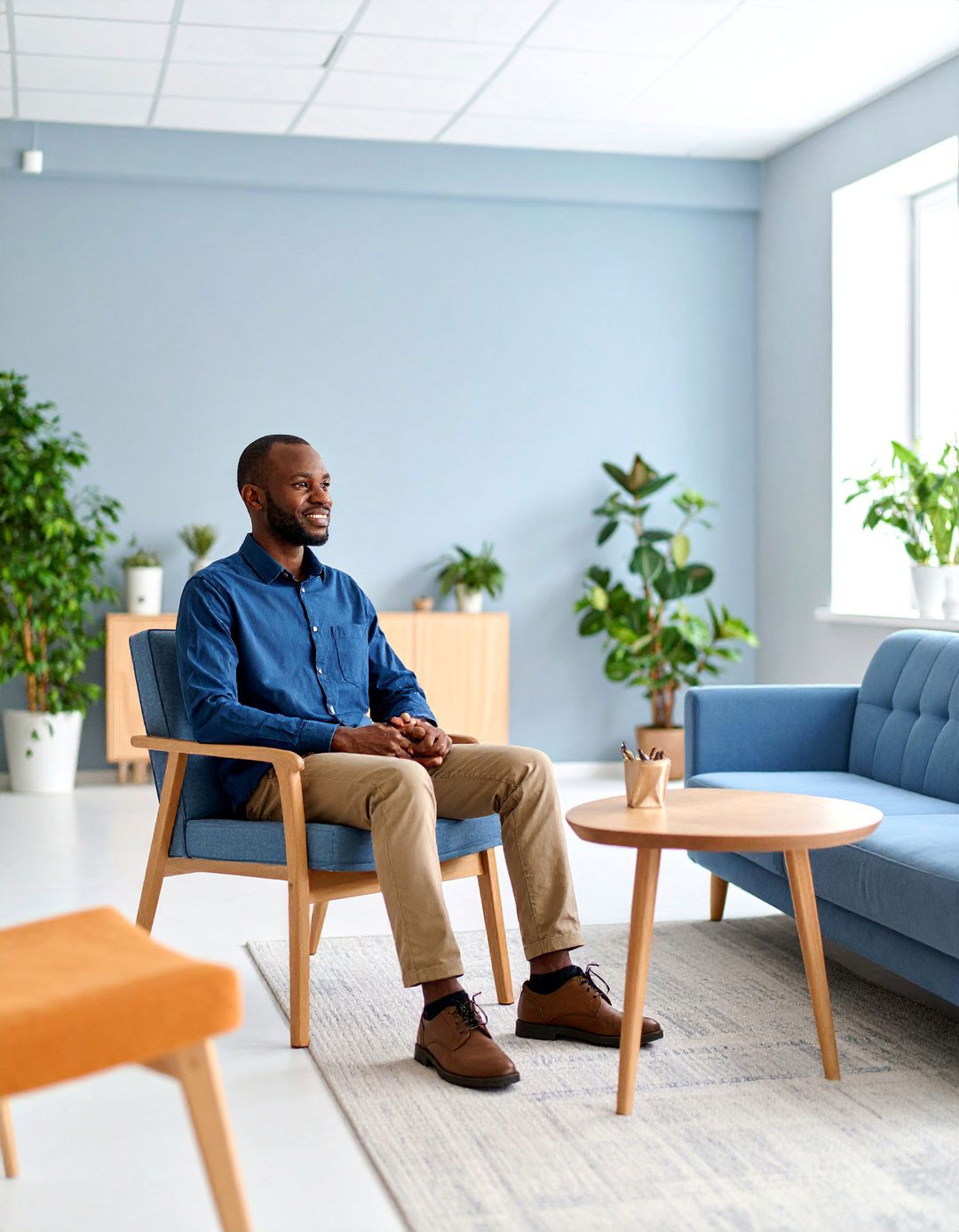
This carefully planned therapeutic environment prioritizes physical and emotional safety through strategic layout, clear sightlines, and trauma-sensitive design elements. The foundation ensures multiple exit routes are visible, seating arrangements allow clients to position themselves facing the door, and no furniture blocks pathways or creates trapped feelings. The color palette emphasizes calming neutrals—soft grays, warm beiges, and gentle blues—while avoiding red tones that might trigger activation responses. Lighting design provides consistent, gentle illumination without harsh shadows or unexpected changes that could startle sensitive clients. Sound management includes acoustic panels, soft furnishings, and white noise options to mask external disruptions. Storage remains completely secured and out of sight to prevent clients from feeling observed or judged. Artwork depicts peaceful, non-threatening scenes without human figures that might trigger memories. This design demonstrates understanding of trauma responses while creating an environment where healing can occur safely and at the client's own pace.
13. Technology-Free Therapist Room with Analog Elements

This intentionally disconnected therapeutic space provides refuge from digital overwhelm through analog elements, natural materials, and traditional communication tools. The foundation eliminates all visible technology—no computer screens, digital clocks, or electronic devices that might distract from human connection. Furniture includes traditional wooden pieces, handcrafted elements, and vintage items that evoke simpler times. A mechanical wind-up clock provides time awareness without digital intrusion, while handwritten inspirational quotes replace digital displays. Communication tools include physical journals, art supplies, board games, and tactile items that encourage hands-on engagement. Natural lighting supplements with warm incandescent bulbs rather than LED fixtures, creating softer illumination. The space includes books, magazines, and printed materials that invite quiet reflection and analog learning. Plants and natural elements reinforce the connection to non-digital life. This design supports clients struggling with technology addiction, social media anxiety, or those seeking deeper human connection in an increasingly digital world.
14. Multi-Cultural Therapist Room with Inclusive Representation
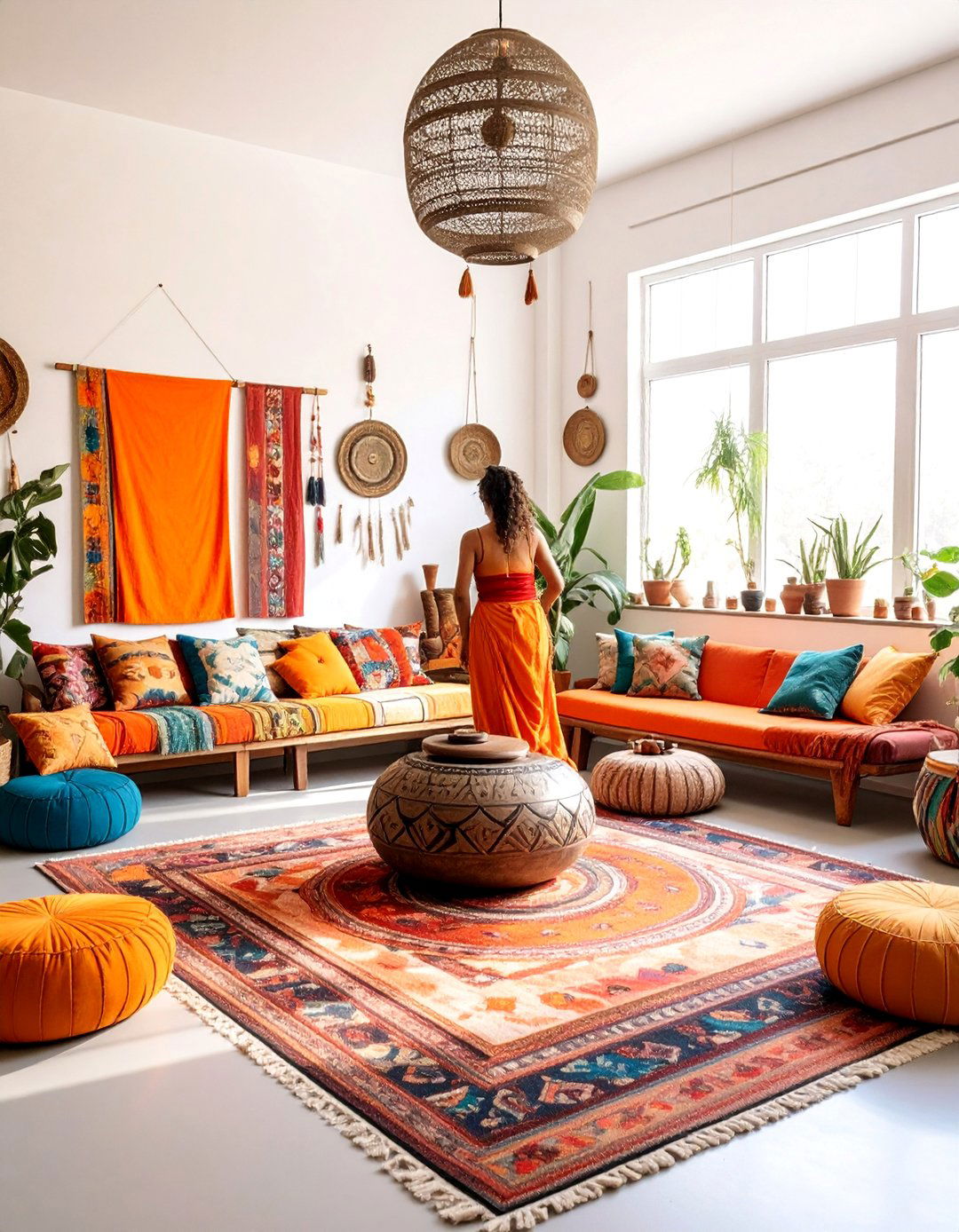
This globally-inspired therapeutic environment celebrates cultural diversity through thoughtful representation, inclusive imagery, and universal design elements. The foundation includes furniture and decor from various cultural traditions—African carved stools, Asian meditation cushions, Latin American textiles, and European vintage pieces that honor different heritage backgrounds. Artwork features diverse faces, cultural celebrations, and global landscapes that help clients from all backgrounds feel seen and valued. Color schemes draw from various cultural palettes while maintaining therapeutic appropriateness—warm earth tones, jewel colors, and natural hues that feel welcoming rather than overwhelming. Books and resources represent multiple languages, cultures, and therapeutic approaches that acknowledge different healing traditions. The space includes cultural artifacts, musical instruments, and symbolic items that can facilitate discussions about identity, heritage, and belonging. This design supports therapists working with diverse populations while creating an environment where cultural identity is celebrated rather than minimized during the therapeutic process.
15. Small Space Therapist Room with Multi-Functional Furniture

This efficiently designed therapeutic environment maximizes limited square footage through clever furniture selection, vertical storage, and space-enhancing design techniques. The foundation includes furniture pieces that serve multiple purposes—storage ottomans that provide seating and organization, nesting tables that expand when needed, and wall-mounted desks that fold away when not in use. The color palette emphasizes light, reflective tones that make the space feel larger—whites, pale grays, and soft pastels create visual expansion. Strategic mirror placement reflects natural light and creates the illusion of additional space without compromising privacy. Vertical storage solutions include tall, narrow bookcases, wall-mounted shelves, and hanging organizers that keep necessities accessible without cluttering floor space. Lighting design incorporates under-cabinet illumination, wall sconces, and pendant lights that provide adequate illumination without consuming precious square footage. This design proves that effective therapeutic environments don't require large spaces, demonstrating that thoughtful planning can create intimate, functional settings for meaningful therapeutic work.
16. Nature-View Therapist Room with Window-Focused Layout
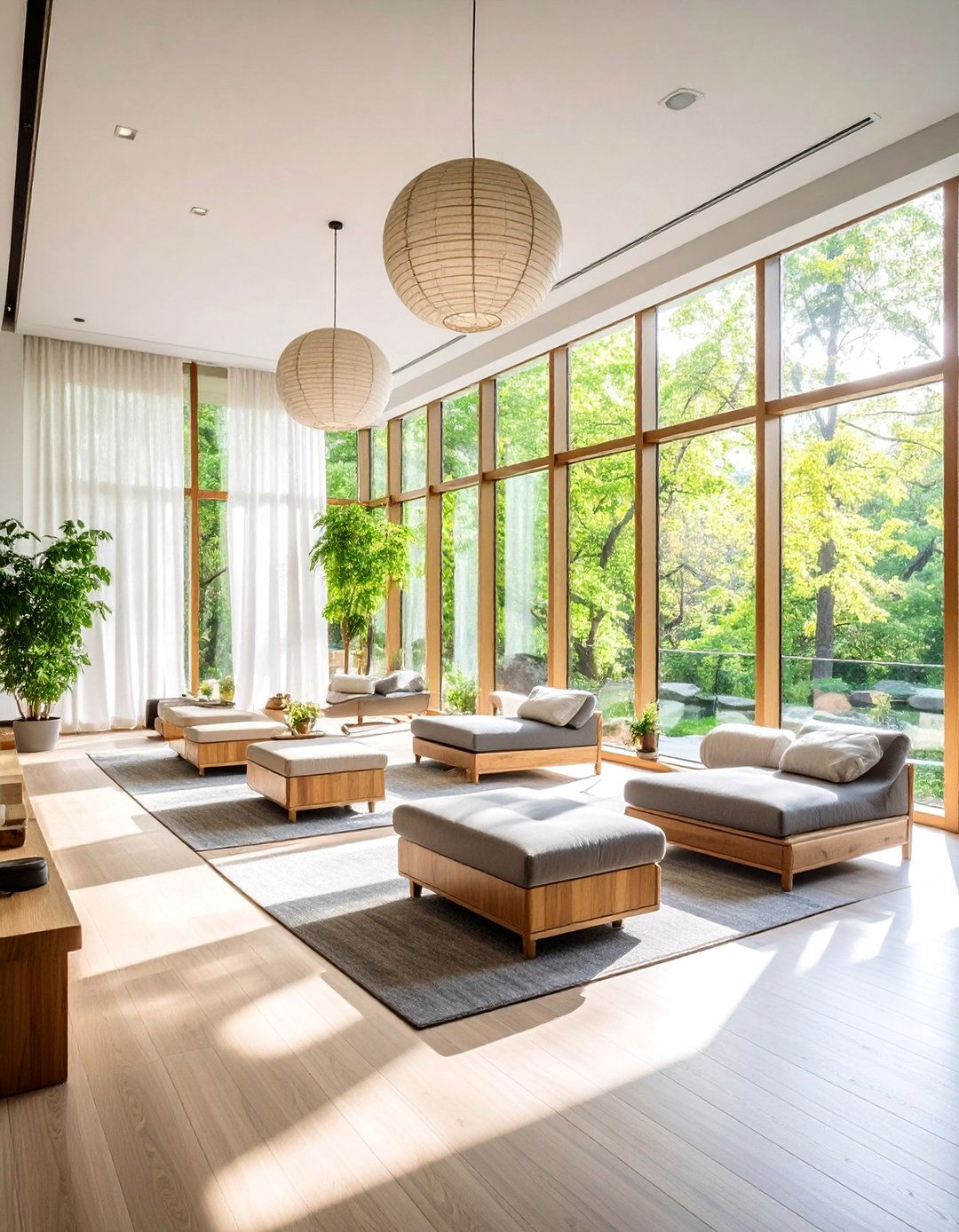
This outdoor-connected therapeutic environment prioritizes natural views and landscape connection through strategic window placement and nature-oriented design elements. The foundation positions all seating to maximize views of outdoor green spaces, gardens, or natural landscapes that provide visual respite and connection to seasonal changes. Window treatments include sheer curtains or adjustable blinds that control light while maintaining outdoor visibility. Indoor plants complement outdoor views, creating seamless transitions between interior and exterior environments. Furniture selection includes natural materials—wood, rattan, and organic fabrics—that echo outdoor elements and reinforce the nature connection. The color palette draws directly from visible outdoor scenes—seasonal greens, sky blues, earth browns, and floral accents that change with natural cycles. Binoculars or nature guides might be available for clients interested in wildlife observation or botanical learning. Weather-dependent lighting adjusts to complement natural illumination throughout different seasons and times of day. This design supports therapeutic approaches that emphasize grounding, seasonal awareness, and the healing power of nature observation.
17. Music Therapy Therapist Room with Acoustic Design Elements
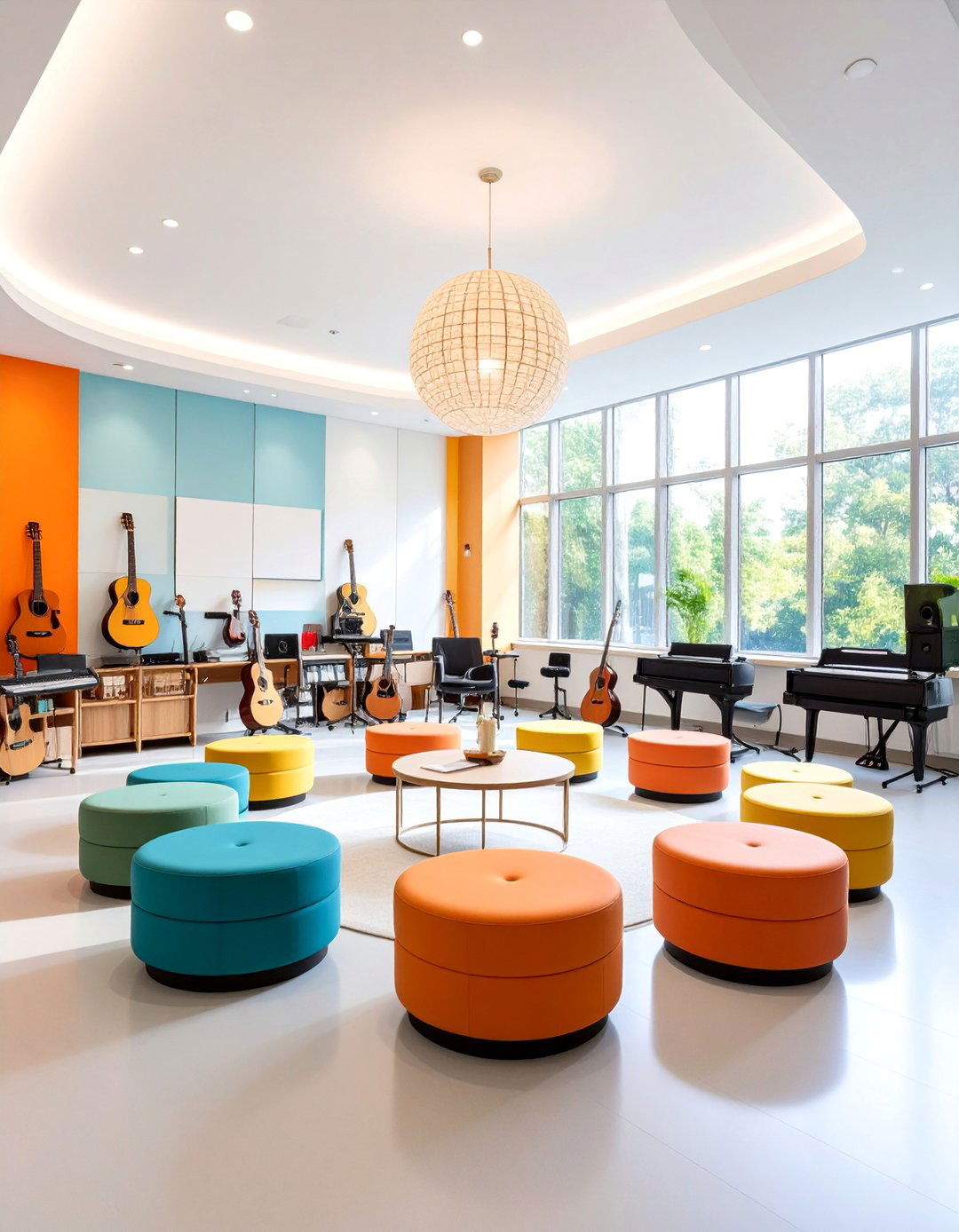
This sound-optimized therapeutic environment supports music therapy and sound-based healing through carefully planned acoustics and instrument accessibility. The foundation includes acoustic panels, sound-absorbing materials, and strategic room shaping that enhance musical experiences while controlling sound transmission to adjacent spaces. Instrument storage provides easy access to guitars, keyboards, percussion instruments, and other therapeutic music tools while maintaining visual organization. Seating arrangements accommodate both individual and group music-making activities, with moveable chairs that allow for circle formations or performance setups. The color palette incorporates warm, inspiring tones that stimulate creativity—deep purples, golden yellows, and rich blues that energize without overwhelming. Lighting design includes adjustable options for different musical activities—bright task lighting for reading music and dimmer ambient lighting for relaxation and listening exercises. Sound equipment includes high-quality speakers, recording capabilities, and noise-canceling options that support various therapeutic music interventions while respecting neighboring spaces.
18. Meditation-Focused Therapist Room with Mindfulness Elements
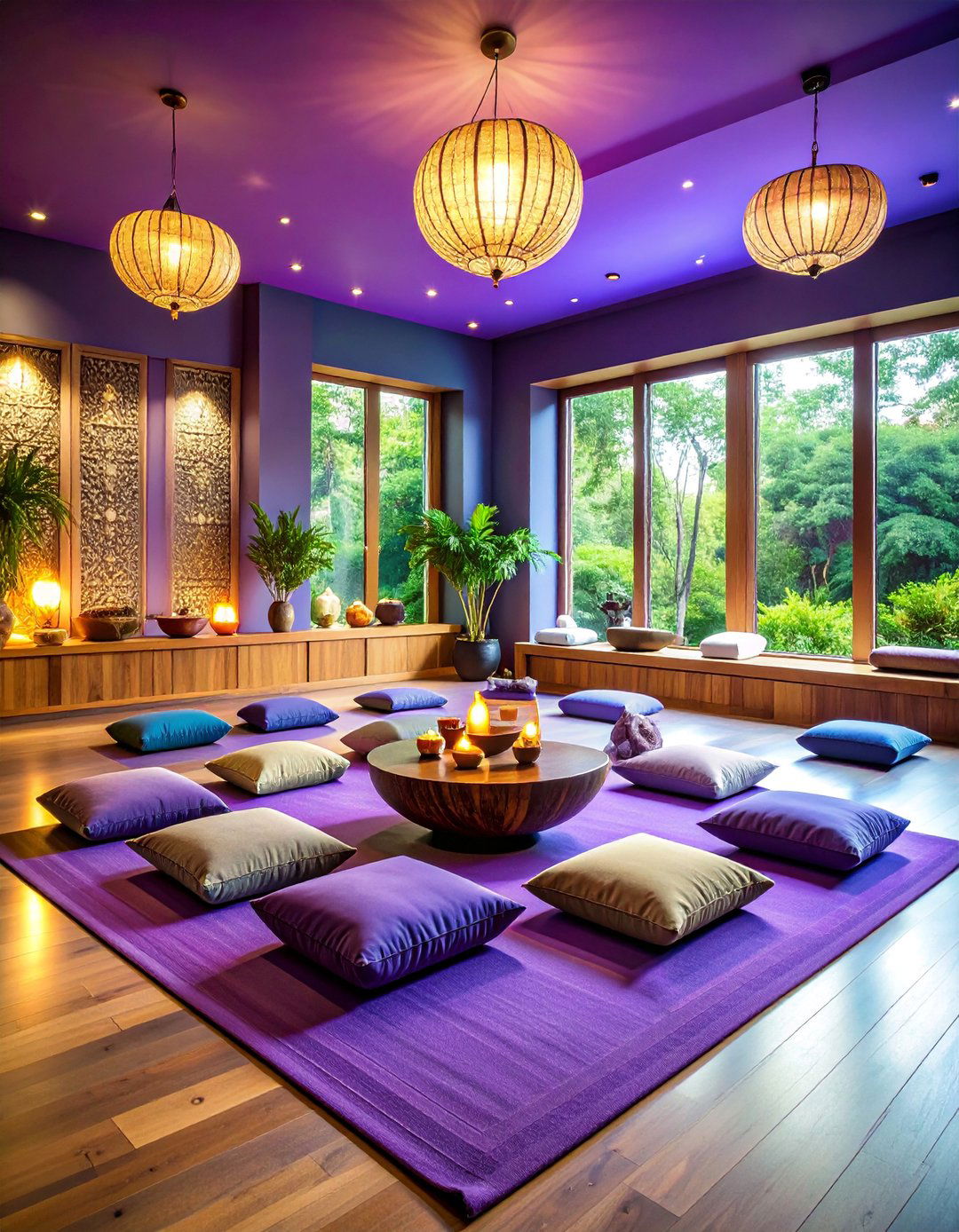
This contemplative therapeutic environment supports mindfulness practices through dedicated meditation spaces and consciousness-expanding design elements. The foundation includes comfortable floor seating options—meditation cushions, yoga mats, and supportive bolsters that accommodate various sitting and lying positions. A designated altar or focal point features meaningful objects—crystals, singing bowls, candles, or spiritual imagery that support contemplative practices without imposing specific religious beliefs. The color palette emphasizes calming, centering tones—deep purples, soft greens, and warm golds that promote introspection and spiritual connection. Lighting design includes adjustable options from bright awareness-enhancing illumination to dim meditative ambiance, with candles and salt lamps providing natural light sources. Sound management includes options for silence, nature sounds, or meditative music that support different contemplative practices. The space eliminates visual distractions while including elements that support breath awareness, body scanning, and other mindfulness techniques that enhance therapeutic outcomes through present-moment awareness.
19. Coastal Therapist Room with Ocean-Inspired Elements
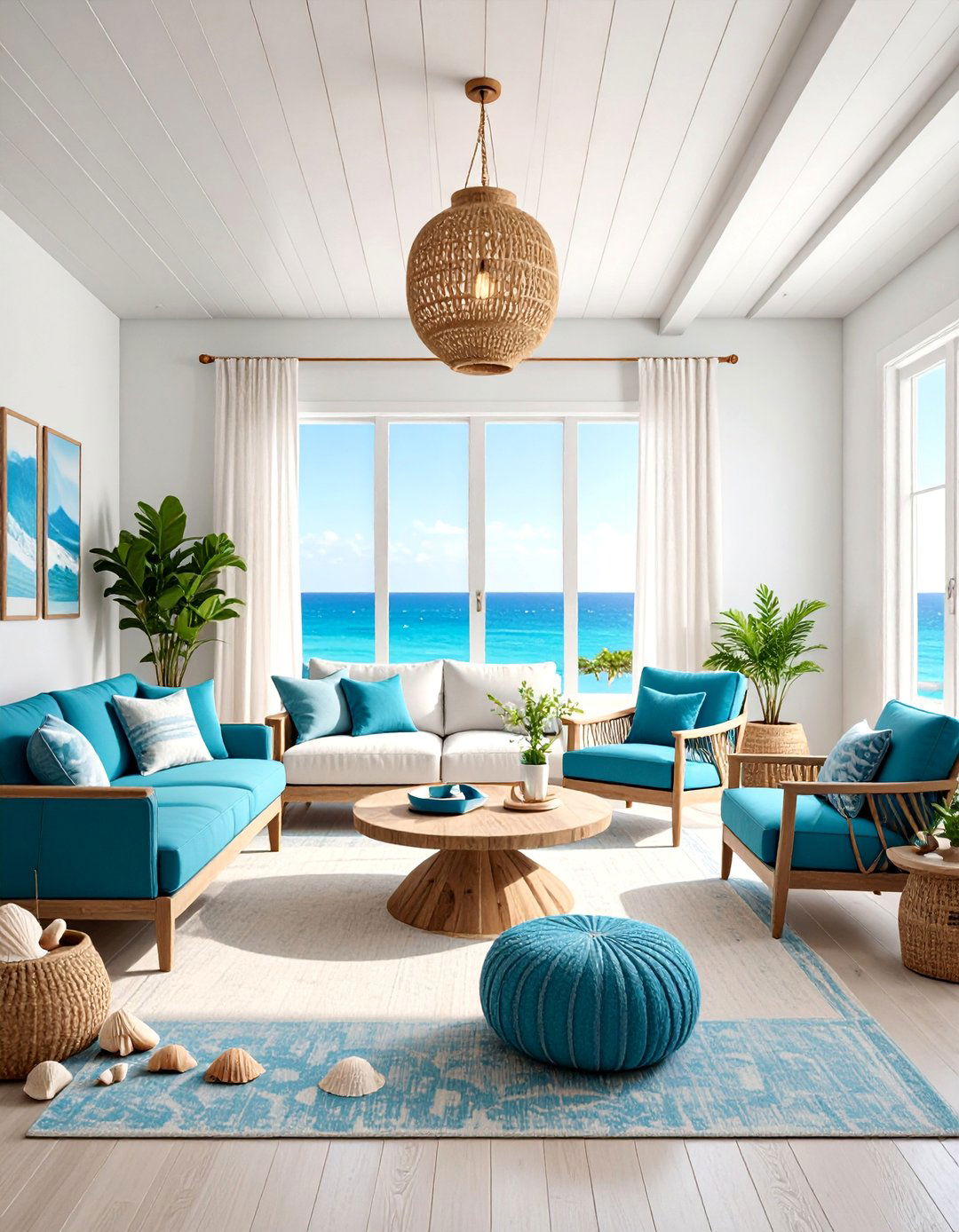
This seaside-inspired therapeutic environment evokes the calming, rhythmic qualities of ocean environments through blue-toned palettes and natural textures. The foundation includes weathered wood furniture, natural fiber rugs, and coastal artwork that transport clients to peaceful shoreline settings. The color scheme flows from deep navy through seafoam green to sandy beige, creating visual waves that promote relaxation and emotional flow. Decorative elements include seashells, driftwood pieces, and ocean photography that reinforce the maritime theme without becoming kitschy. Lighting design mimics natural seaside illumination through white and blue-toned fixtures that create the feeling of reflected water light. Sound elements might include gentle wave recordings or water features that provide the rhythmic audio associated with coastal relaxation. Furniture includes rope details, canvas fabrics, and glass accents that echo boat and beach aesthetics. This design appeals to clients who find water environments particularly calming while supporting therapeutic work focused on emotional flow, release, and renewal.
20. Autumn-Inspired Therapist Room with Seasonal Warmth
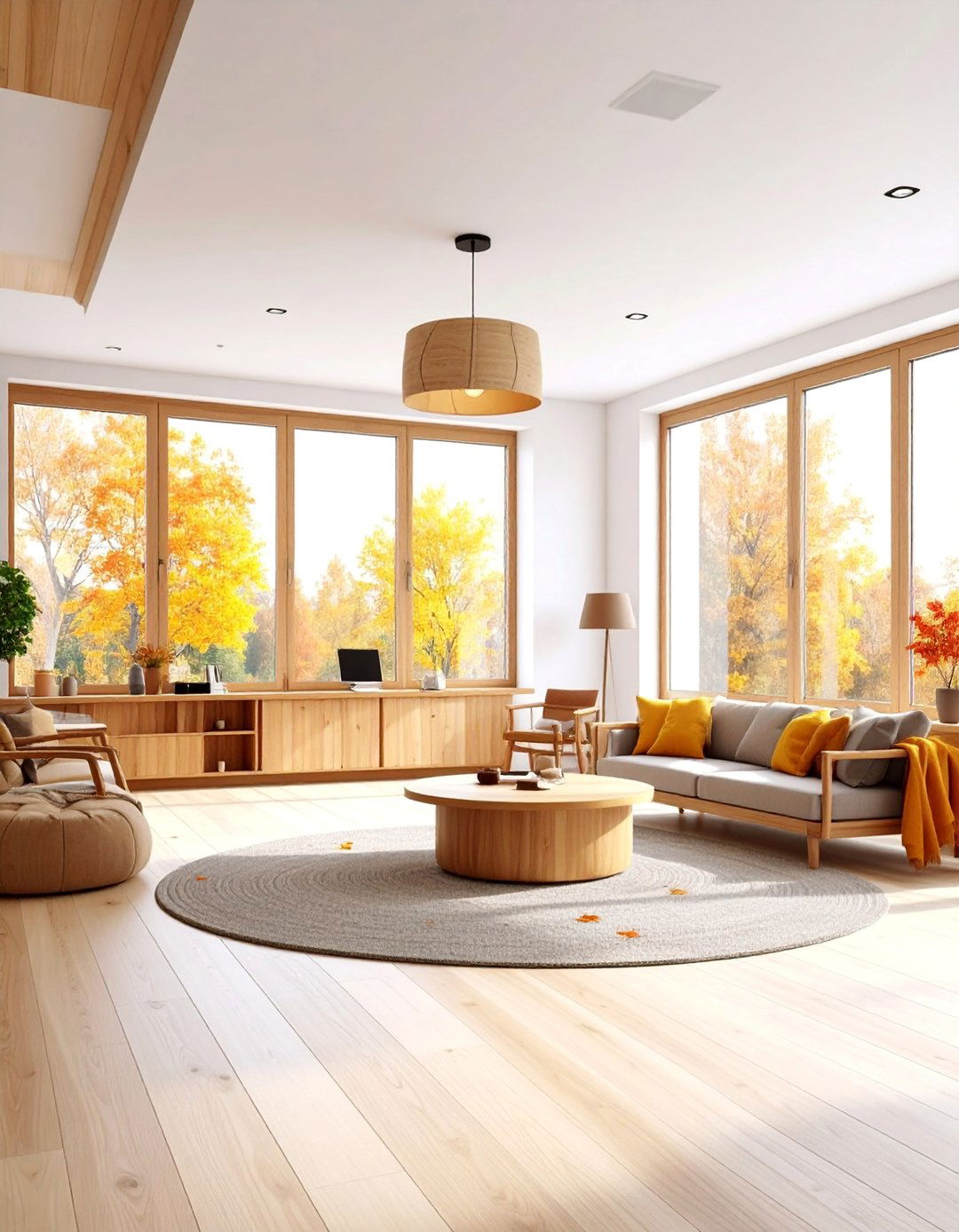
This seasonally-themed therapeutic environment embraces the grounding, transitional qualities of autumn through warm colors and natural elements. The foundation features rich amber, deep orange, and golden yellow accents against neutral backgrounds that create warmth without overwhelming brightness. Furniture includes pieces in warm wood tones—cherry, maple, or oak—that echo autumn forest settings. Decorative elements change seasonally but might include preserved leaves, gourds, pinecones, and harvest-themed artwork that celebrate natural cycles and change. Lighting design emphasizes warmth through amber-toned bulbs and fixtures that mimic autumn sunlight filtering through colorful leaves. Textiles include wool throws, corduroy cushions, and tapestry fabrics in harvest colors that add tactile warmth and visual richness. Scent elements might include subtle autumn fragrances—cinnamon, apple, or vanilla—that evoke positive seasonal memories. This design supports therapeutic work around life transitions, seasonal depression, and clients who find comfort in natural cycles and traditional seasonal celebrations.
21. Reading Corner Therapist Room with Library Atmosphere

This book-focused therapeutic environment creates a literary sanctuary through extensive book collections and scholarly atmosphere that supports bibliotherapy and intellectual exploration. The foundation includes floor-to-ceiling bookshelves filled with therapeutic resources, self-help materials, fiction that explores human experiences, and reference materials that clients can explore. Comfortable reading chairs with excellent task lighting encourage literary engagement, while small side tables provide space for note-taking and personal reflection. The color palette draws from classic library aesthetics—rich mahogany, forest green, and cream tones that create scholarly sophistication. Lighting design includes adjustable reading lamps, warm overhead illumination, and natural light that supports extended reading sessions. The space includes quiet background music, comfortable temperature control, and minimal distractions that support focused literary engagement. Book recommendation systems, reading journals, and discussion guides help therapists integrate bibliotherapy into treatment plans while empowering clients to continue learning and growth outside session times through carefully selected reading materials.
22. Family Therapy Room with Flexible Seating Arrangements
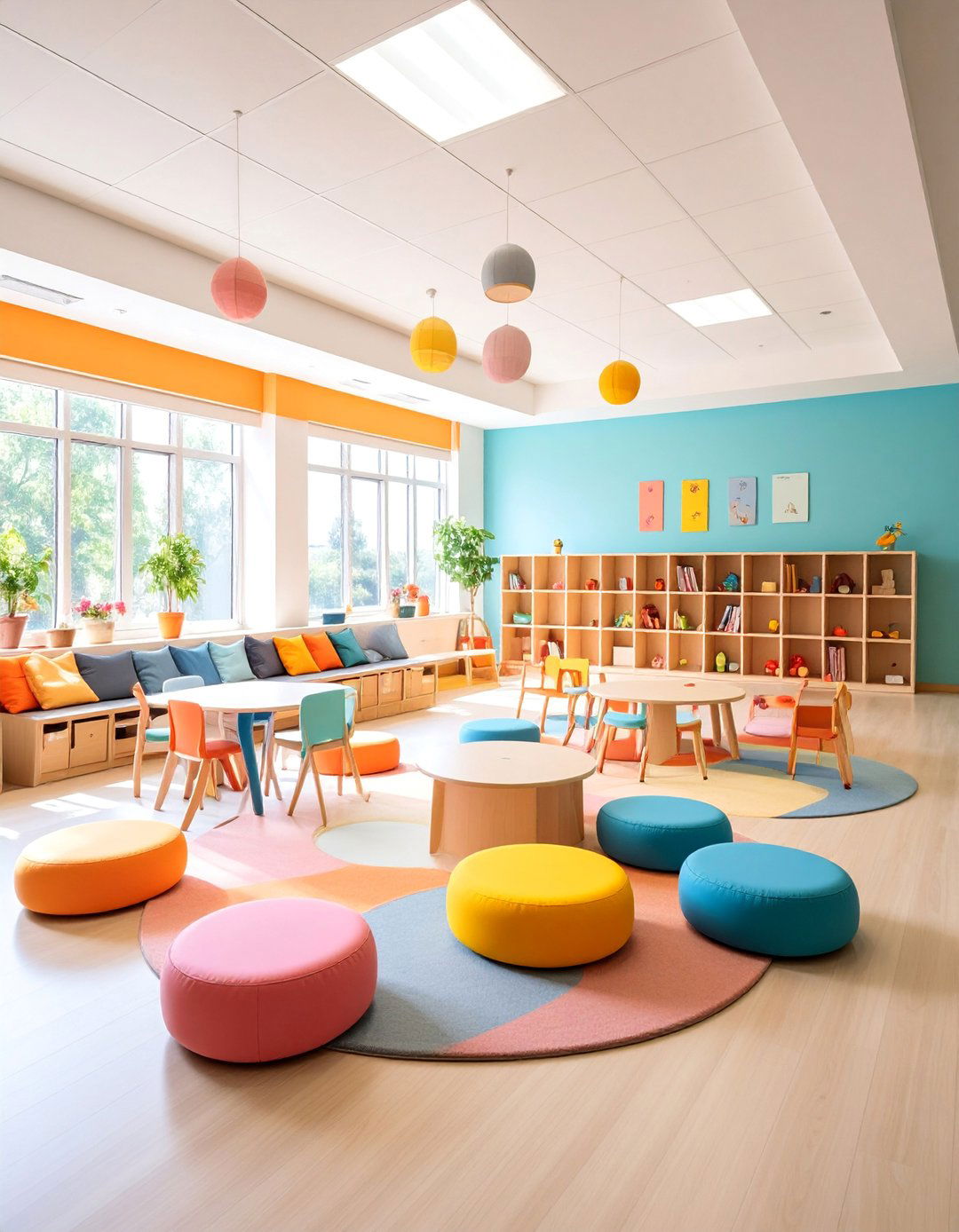
This adaptable therapeutic environment accommodates various family configurations through moveable furniture and flexible space planning that supports different group dynamics. The foundation includes multiple seating options—individual chairs, small sofas, floor cushions, and ottomans—that can be rearranged based on family size and therapeutic activities. Storage solutions keep toys, games, and activity materials organized yet accessible for families with children of different ages. The color palette remains neutral and non-threatening while including cheerful accents that appeal to both adults and children without favoring either group. Lighting design provides bright, welcoming illumination that helps families feel comfortable while ensuring good visibility for observing family interactions. Sound management includes acoustic treatments that contain family discussions while providing options for background music or white noise when needed. Activity zones accommodate different therapeutic interventions—play therapy areas for children, discussion circles for adults, and creative spaces for family art projects that support healing and communication improvement.
23. Teenager-Focused Therapist Room with Contemporary Youth Appeal
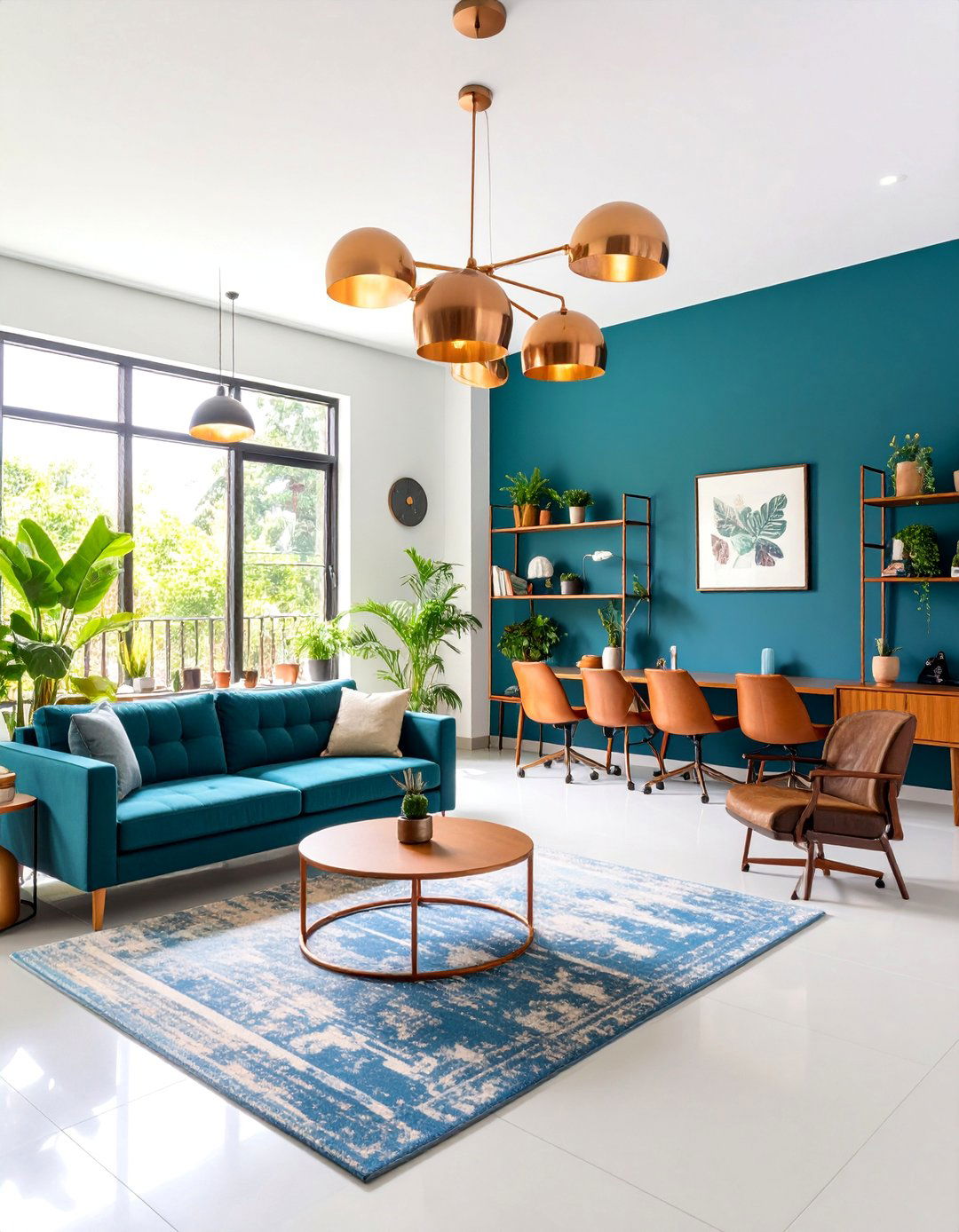
This age-appropriate therapeutic environment speaks to adolescent experiences through contemporary design elements and youth-friendly features that build rapport with teenage clients. The foundation includes modern furniture with clean lines, technology-friendly features, and seating options that feel more like trendy coffee shops than clinical offices. The color palette incorporates current trends while maintaining therapeutic appropriateness—perhaps deep teal, charcoal gray, and copper accents that feel sophisticated rather than childish. Decorative elements include contemporary artwork, music-related items, and cultural references that acknowledge teen interests without trying too hard to be cool. Technology integration includes charging stations, Bluetooth speakers, and spaces for digital devices that respect teen relationships with technology while maintaining therapeutic boundaries. The space includes stress-relief items appropriate for teens—fidget tools, art supplies, and games that provide alternative communication methods. This design demonstrates respect for adolescent development while creating an environment where teens feel understood rather than patronized during therapeutic exploration.
24. Couple's Therapy Room with Intimate Conversation Areas

This relationship-focused therapeutic environment supports intimate communication through carefully planned seating arrangements and romantic yet professional atmosphere. The foundation includes two comfortable chairs positioned at optimal angles for eye contact and connection, with a small table between them for tissues, water, or therapeutic materials. Additional seating options accommodate different comfort levels—a small sofa for couples who prefer closer proximity or separate chairs for those needing more space during difficult conversations. The color palette emphasizes warm, nurturing tones—soft roses, gentle blues, and cream colors that promote emotional openness without overwhelming passion. Lighting design provides adjustable illumination that can be brightened for clarity or dimmed for intimacy as therapeutic work requires. Decorative elements include meaningful artwork about relationships, love, and human connection that inspire positive feelings without imposing specific relationship models. The space maintains complete privacy through sound management and visual barriers while providing couples with an environment that honors their relationship while supporting healing and growth.
25. Virtual Therapy Room with Professional Backdrop Design

This technology-optimized therapeutic environment supports teletherapy and virtual sessions through carefully planned visual backgrounds and technical infrastructure. The foundation includes a dedicated camera-facing wall with professional, non-distracting backdrop options—perhaps a bookshelf, peaceful artwork, or plant arrangement that appears polished on video calls. Lighting design prioritizes facial illumination through ring lights, softbox fixtures, or strategically placed lamps that ensure clear video quality without harsh shadows. Technology infrastructure includes high-speed internet, backup power options, and multiple device charging stations that prevent technical disruptions during virtual sessions. Sound management includes acoustic treatments that improve audio quality while reducing echo and background noise transmission. The therapist workspace includes ergonomic seating, adjustable camera heights, and organized storage for virtual session materials that maintain professionalism while supporting extended screen time. This design acknowledges the growing importance of virtual therapy while ensuring that online therapeutic relationships maintain the warmth, professionalism, and healing potential of in-person connections.
Conclusion:
Creating an effective therapist room requires balancing professional functionality with emotional comfort, therapeutic goals with aesthetic appeal. These twenty-five design themes demonstrate that therapeutic spaces can embrace diverse styles while maintaining their healing purpose. Whether drawn to minimalist zen environments, nature-rich biophilic designs, or culturally inclusive spaces, each approach offers unique benefits for different therapeutic populations and treatment methods. The key lies in selecting design elements that support both therapist comfort and client healing, creating environments where meaningful therapeutic work can flourish through thoughtful attention to color, lighting, furniture, and atmospheric details.


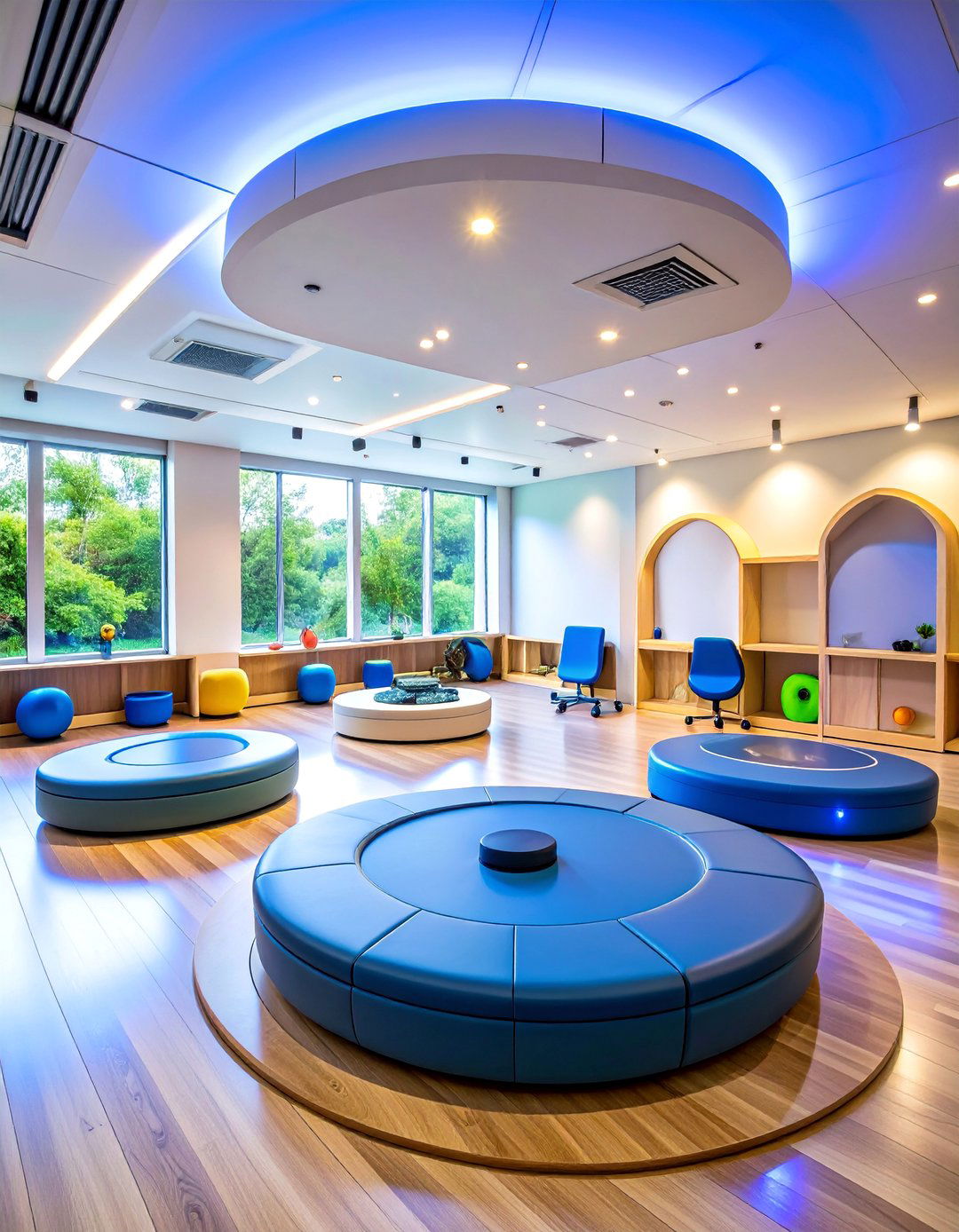
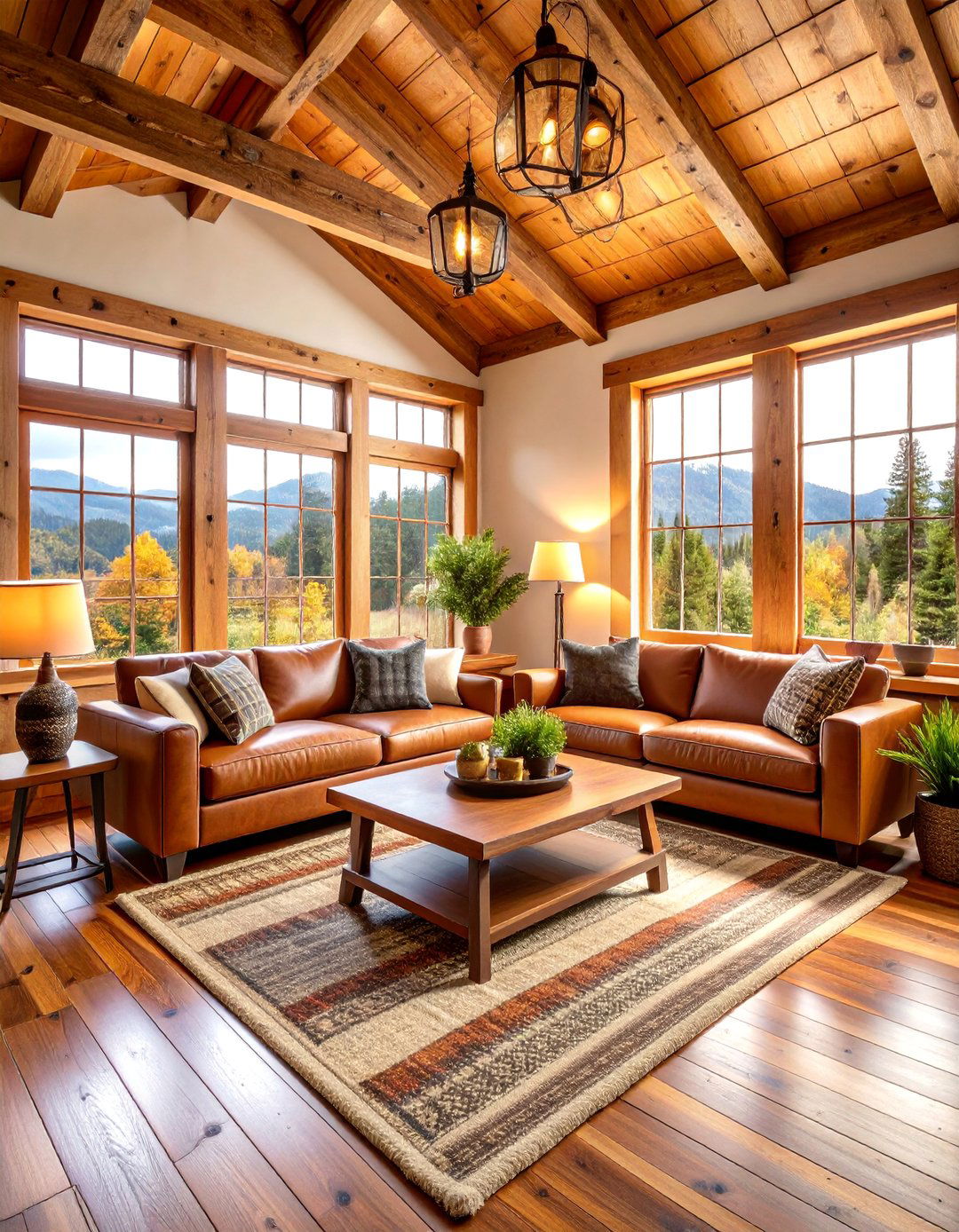
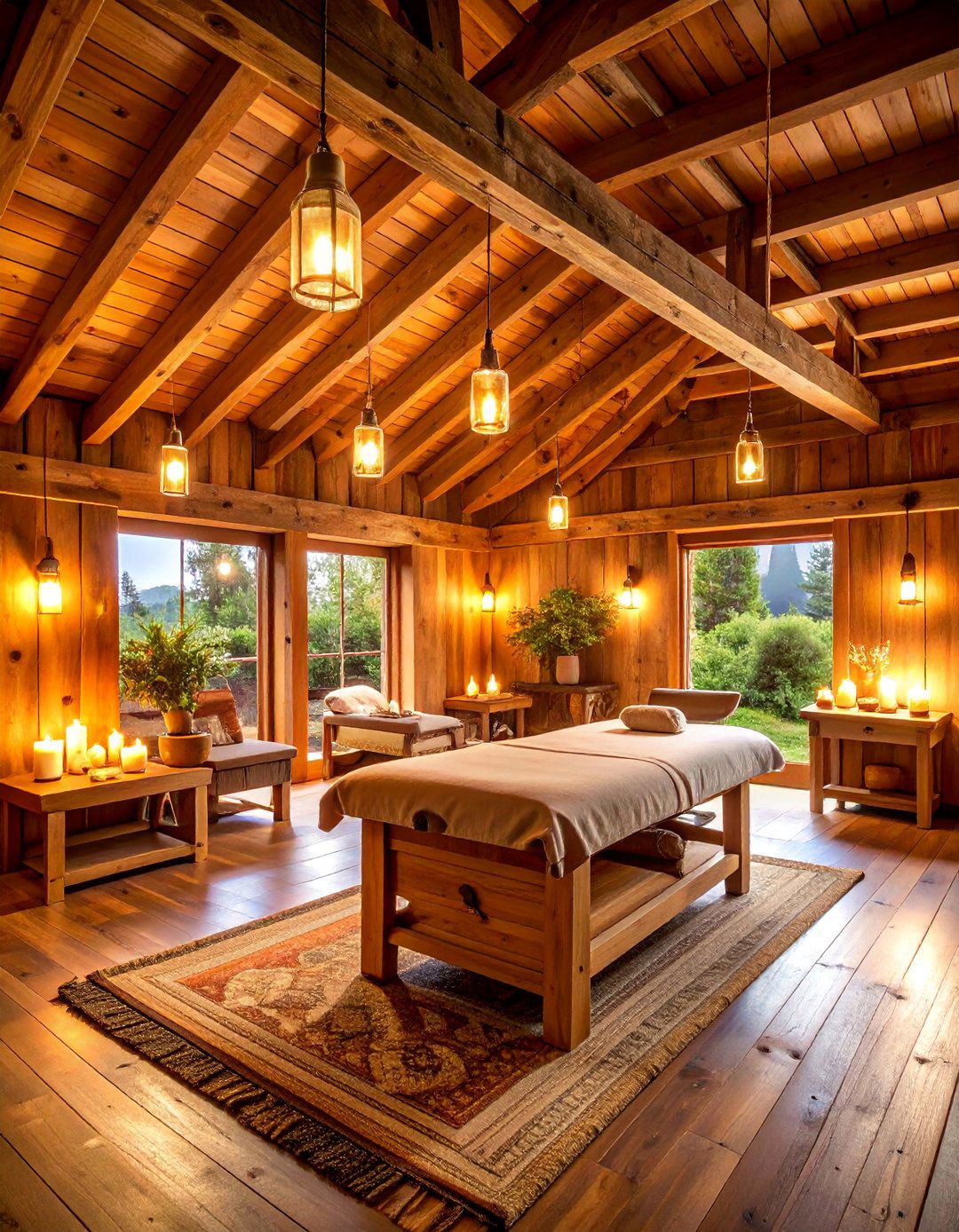
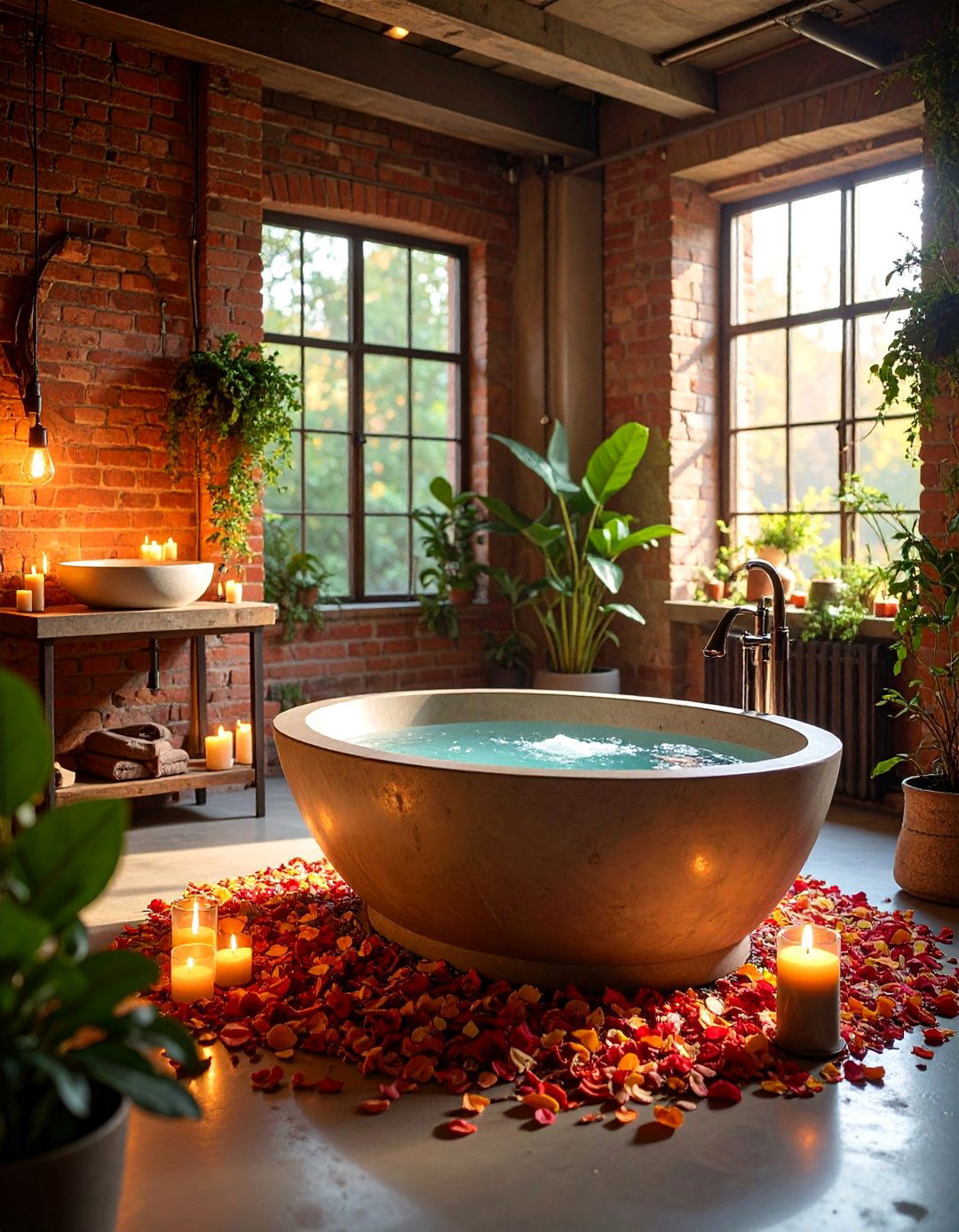

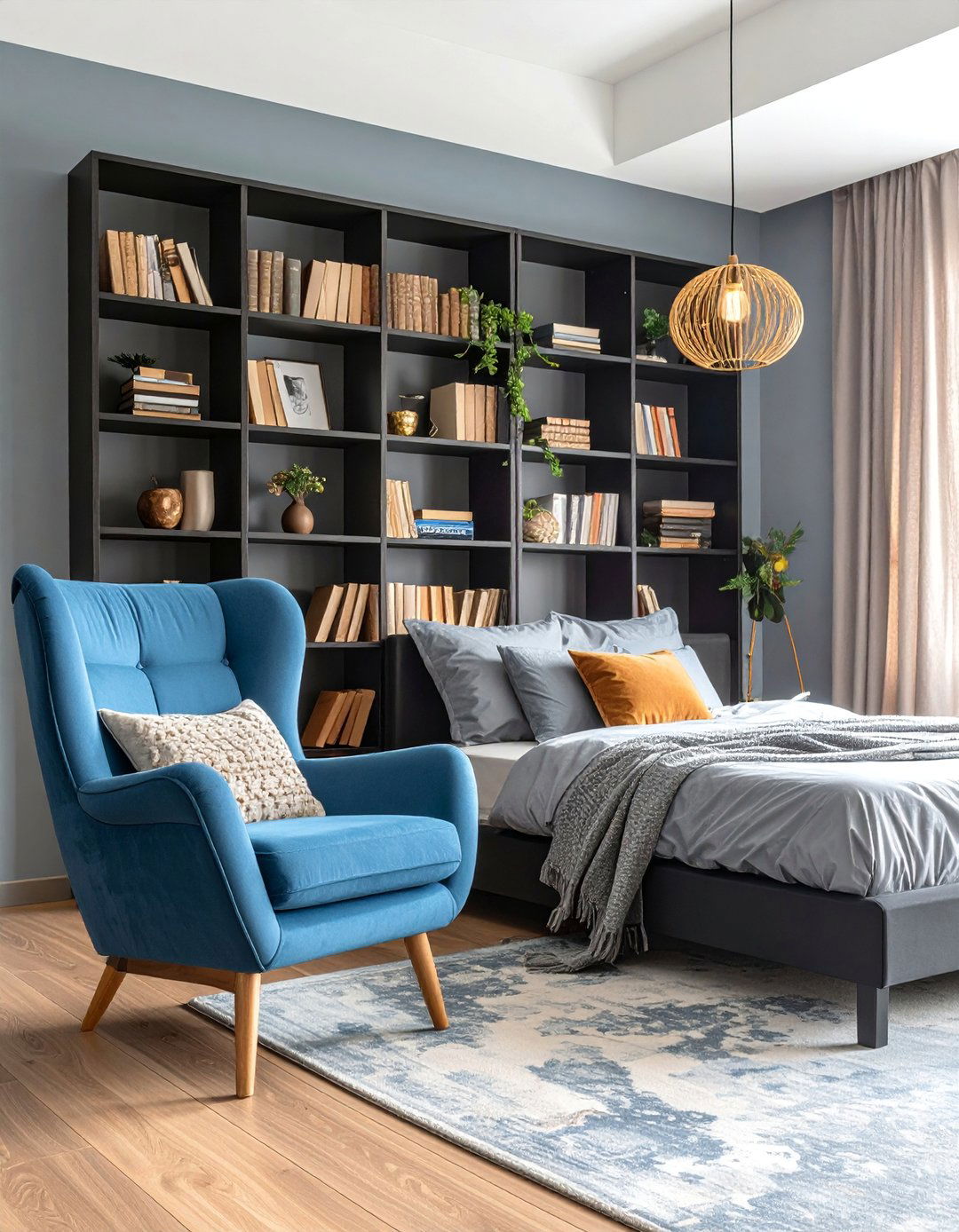
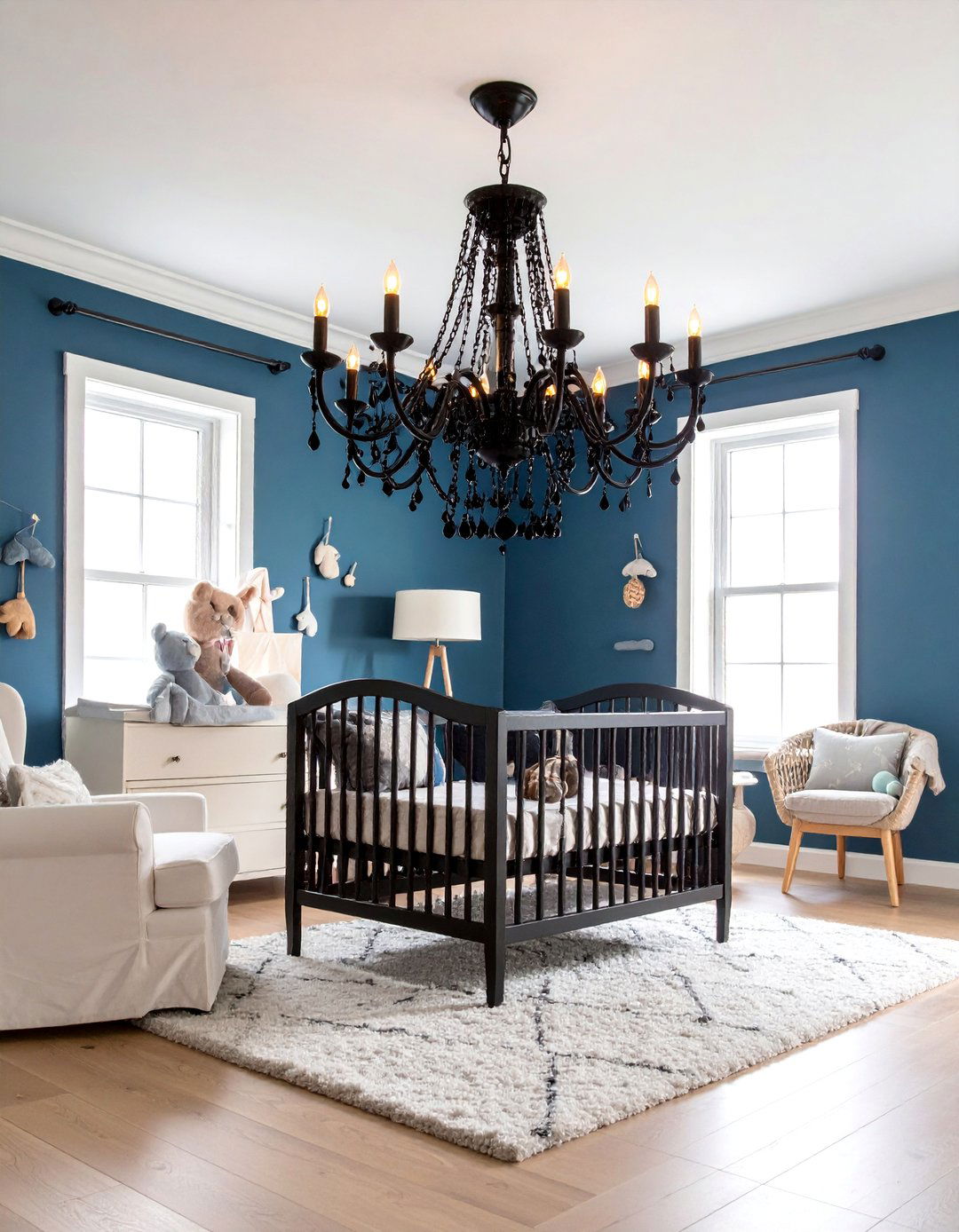
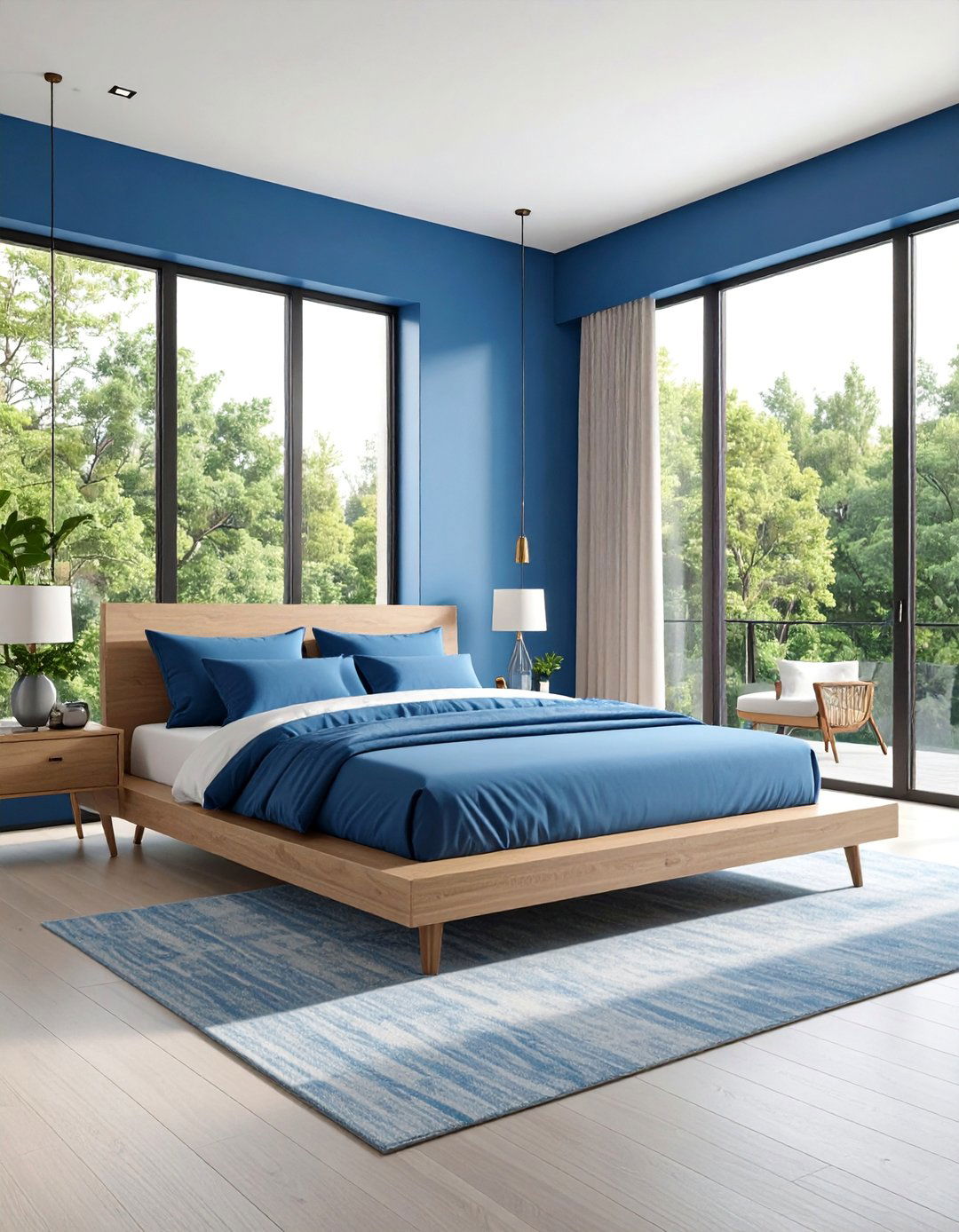
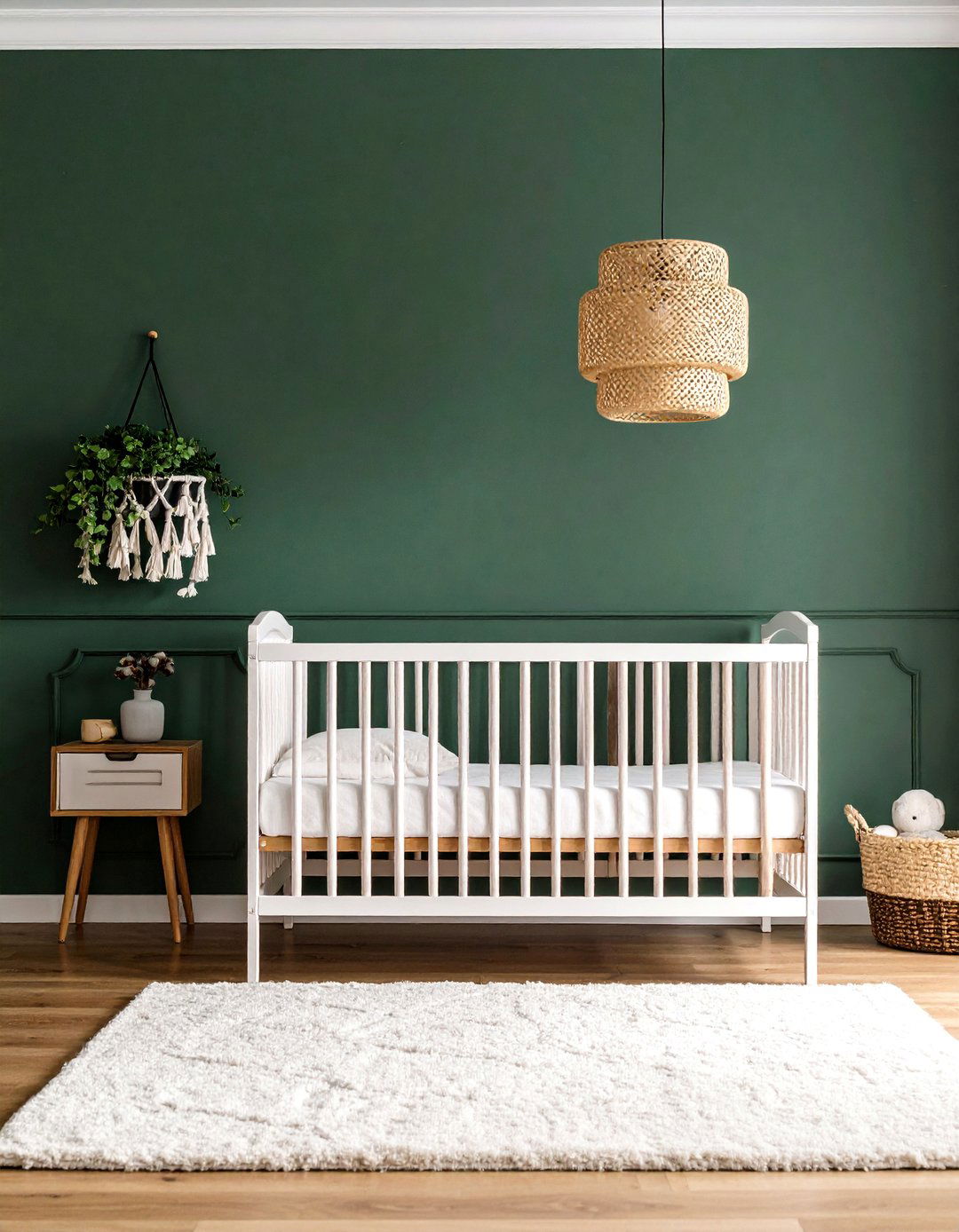
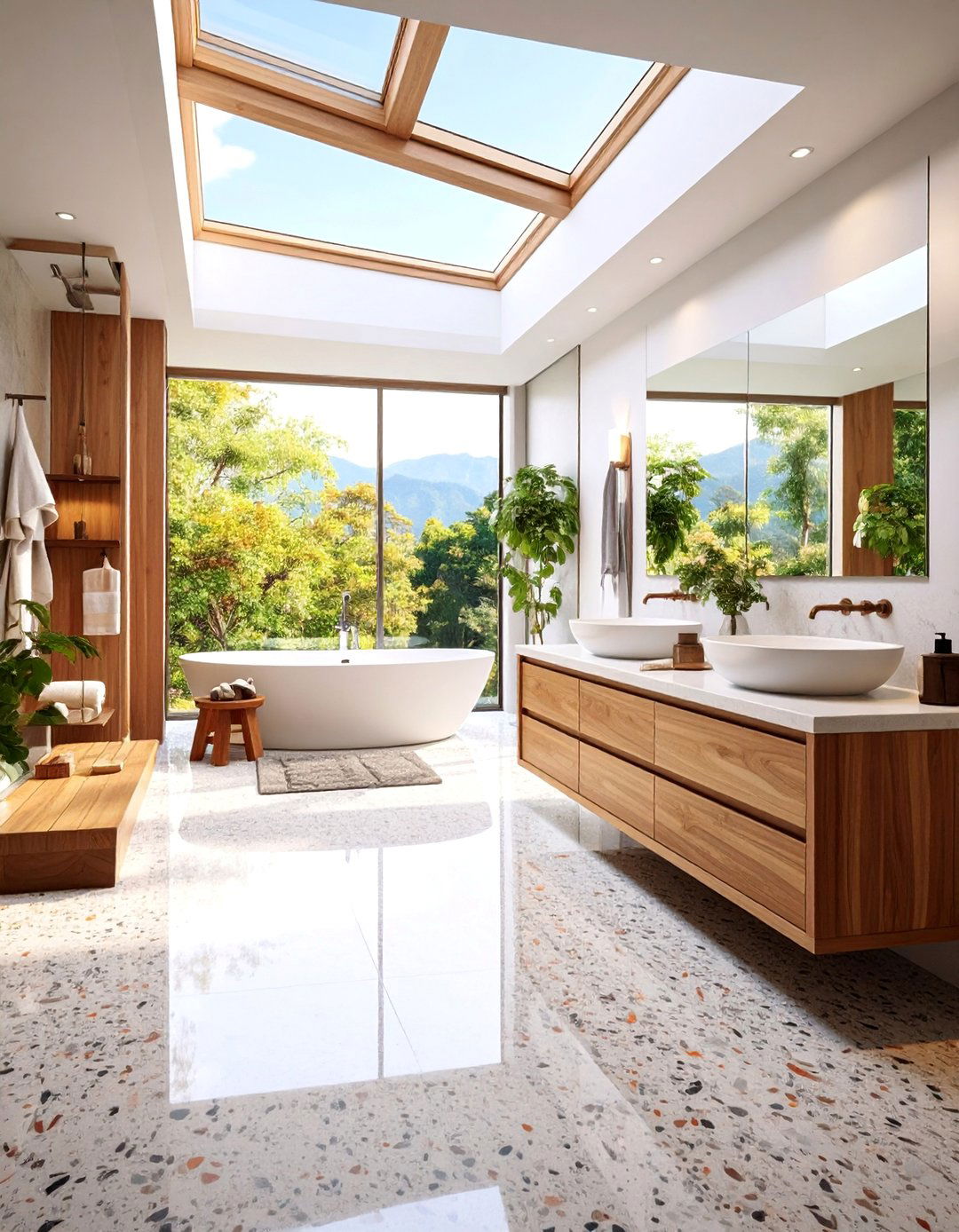
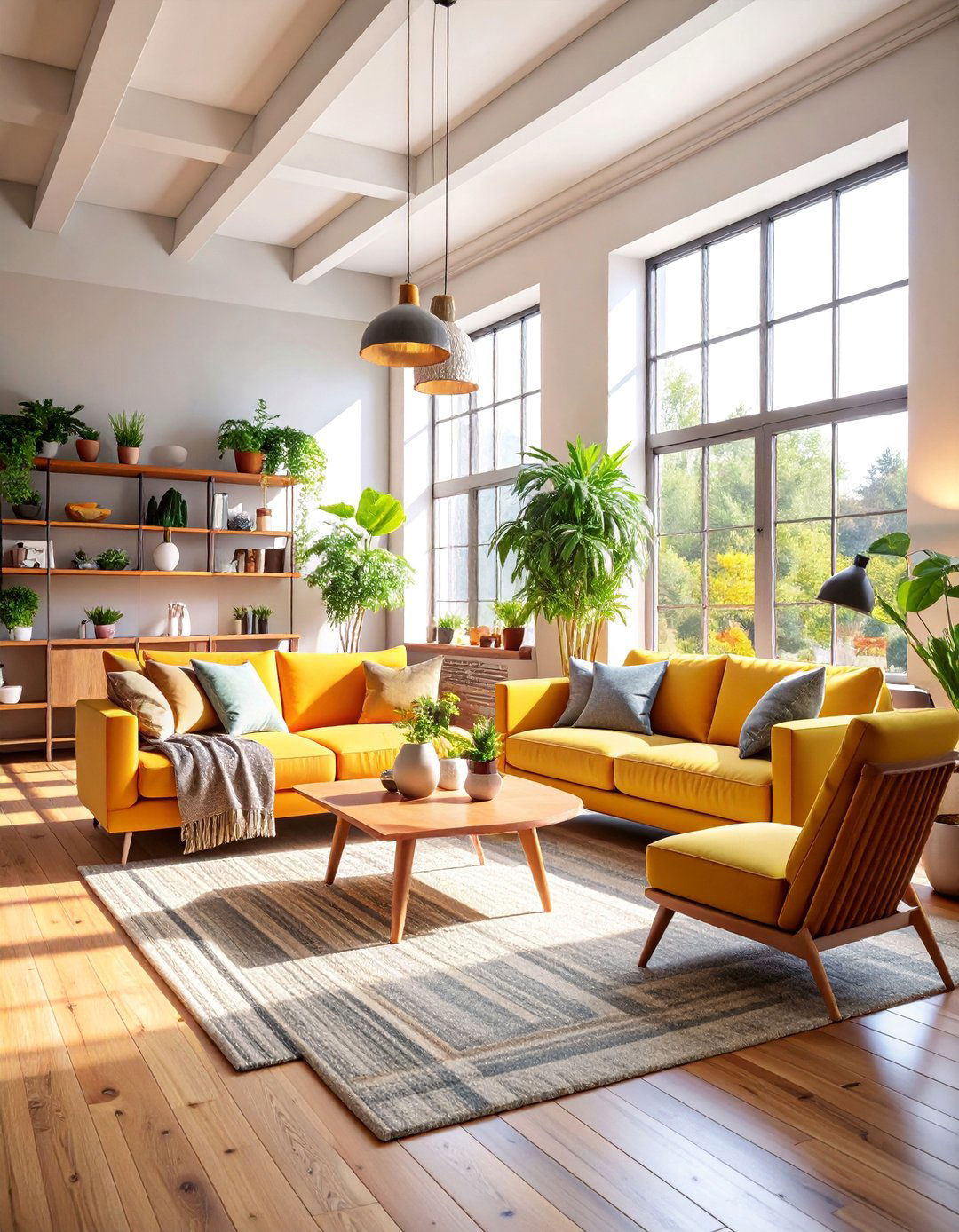

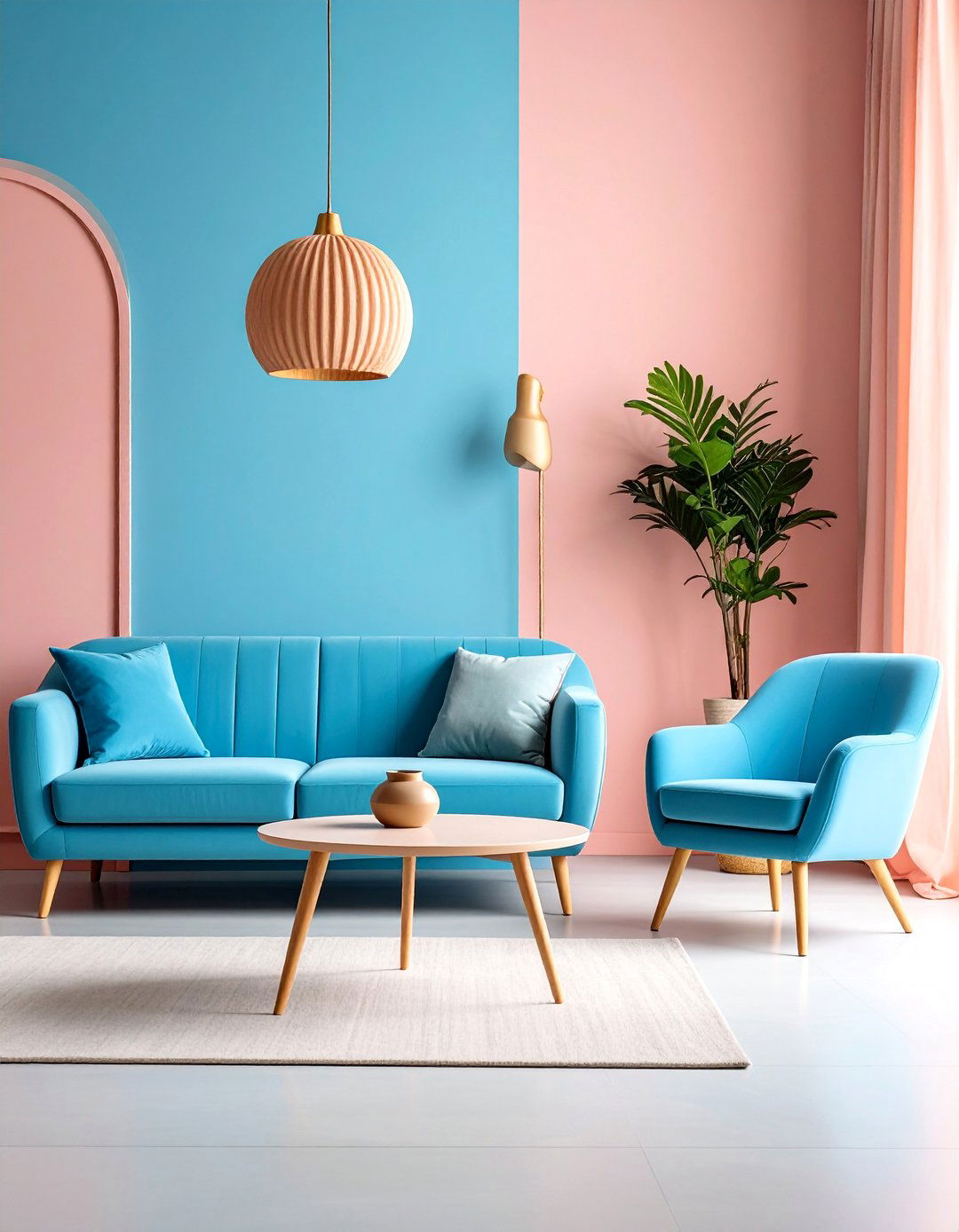
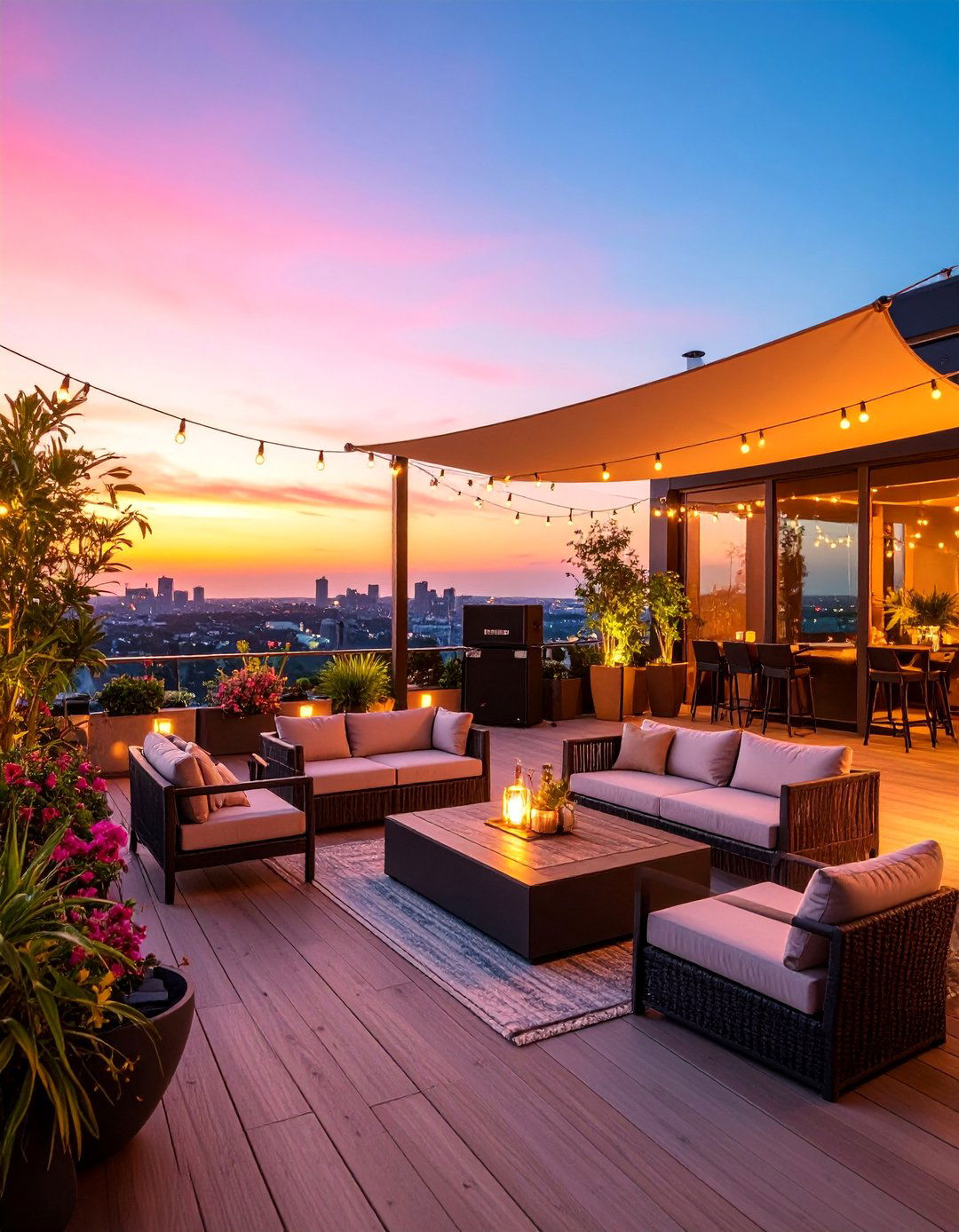
Leave a Reply